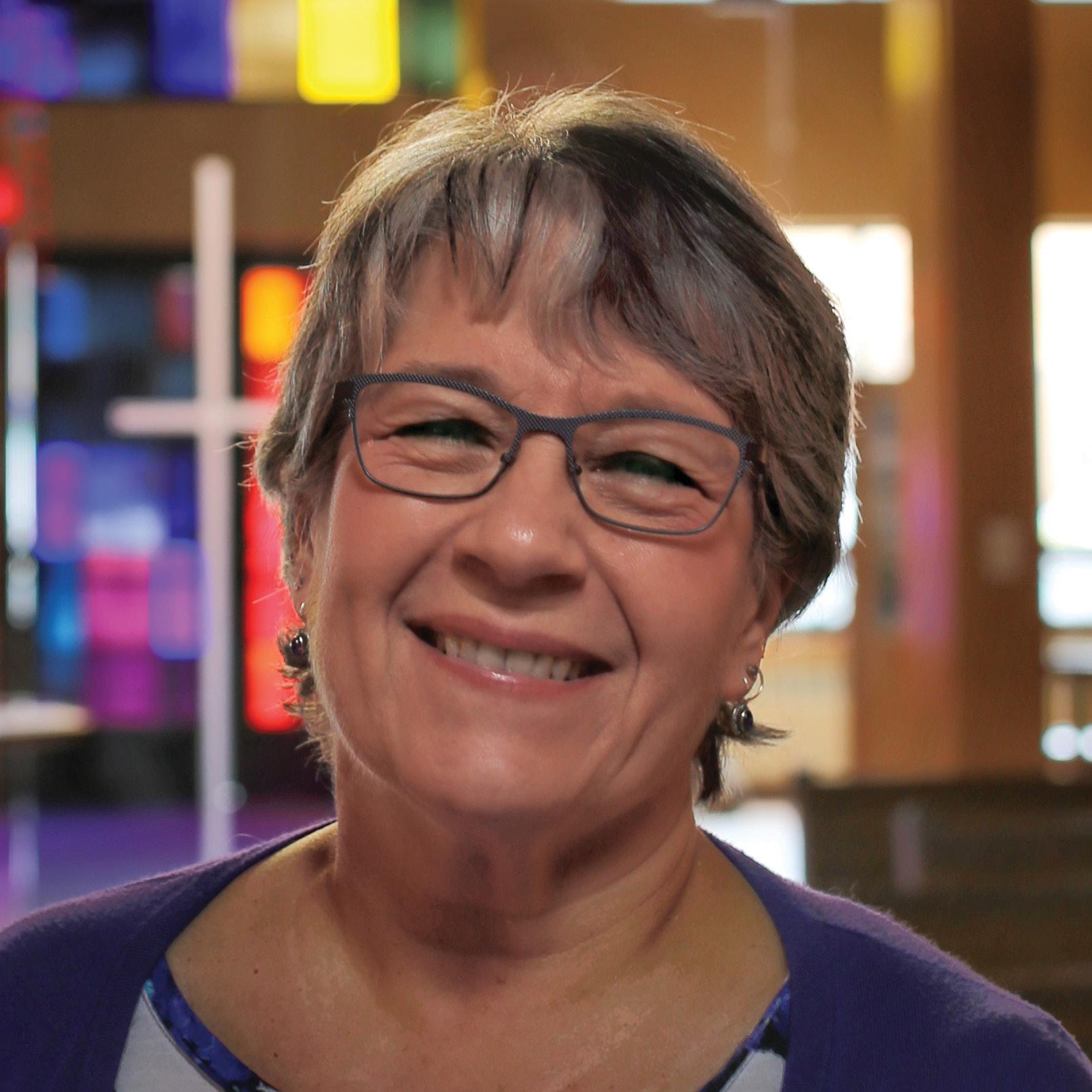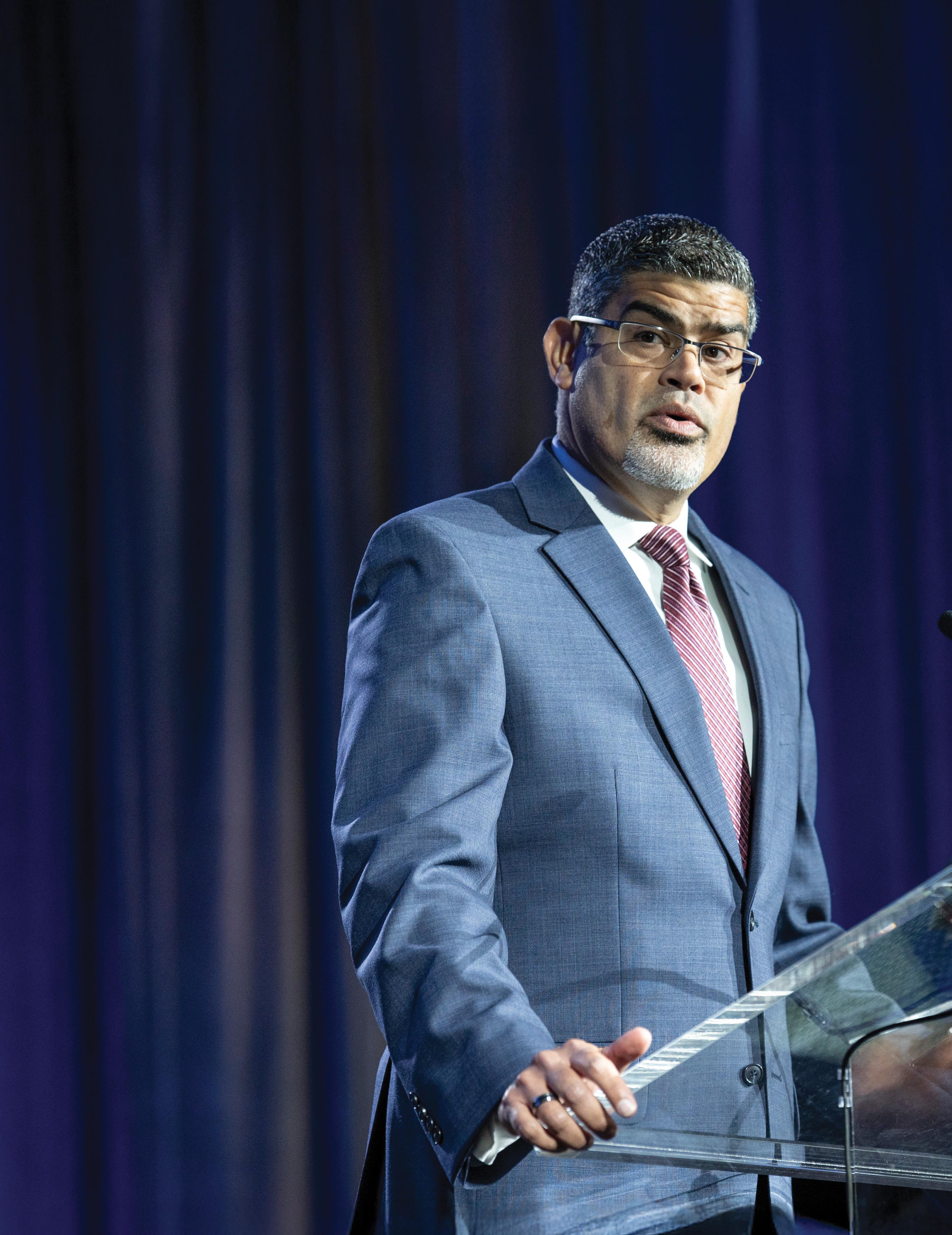

Cooperative Baptists Deepen Belonging in St. Louis
Deepening our Commitment
In late June, our Fellowship experienced a remarkable General Assembly in St. Louis. Registration was the highest it has been since before the pandemic, and the CBF Heartland region served as an incredible host. From the opening celebration and late-night worship on Tuesday all through the week, we shared incredibly powerful times of worship, celebration, learning and community.
I will never forget the recognition of retiring field personnel: the powerful image of 13 field personnel who finished their full-time ministries at the end of June and who, combined, have more than 300 years of global mission service, standing on stage together and being blessed at our Assembly. Through their own gifts, relationships forged over years of faithfulness in communities around the world and with congregations in our Fellowship, these field personnel have participated in an increasingly distinctive and beautiful approach to the global mission of Christ.
Later in the same morning, we received a powerful challenge from our outgoing CBF Moderator Juan Garcia, delivered in Spanish, and were deeply moved by his prophetic and pastoral witness (read on pages 16–21). The Holy Spirit was at work among us in these beautiful moments and so many others.
As we gathered for General Assembly, another summer gathering held 35 years ago was prominently on my mind. It was in August 1990 that several thousand Baptists came to Atlanta for what was then called “A Consultation of Concerned Baptists.” Those who arrived for that meeting carried grief and loss because of profound changes in the Southern Baptist Convention. But they were also determined to find a new way forward, and according to those who were present for that gathering, there was the unmistakable sense that the Spirit was prodding them to do just that.
By the time that consultation concluded, an interim steering committee had been formed to create what we now know as the
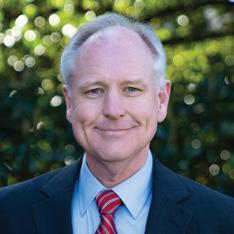
Cooperative Baptist Fellowship. Three and a half decades ago, those who formed our Fellowship dreamed boldly, gave generously and created a community that many of us who were not in those initial gatherings now call home.
As we enter this 35th year, I believe it is time for us to deepen our commitment to the beautiful kind of Baptist witness God is offering through us and for us. As your congregations work this summer on budget proposals for a new year, will you increase your financial support for the life and work of this Fellowship?
If your congregation has a foundation or an endowment fund, will you consider a special gift this summer in honor of our Fellowship’s 35th anniversary and as an investment of hope in our future? If you already support CBF as an individual, will you consider increasing your support as we move through this year or give a generous above-and-beyond gift in honor of this significant anniversary in our life together? If you’ve never supported CBF personally, will you do so beginning this summer?
We came out of St. Louis with considerable energy and momentum. It is powerfully evident that the Triune God is at work, inviting us into even deeper community with Christ and with an increasingly diverse community of congregations and individuals. Together, we are being equipped for even more faithful ministry and called to participate in God’s mission of transformation in this world.
We are more diverse geographically, generationally, racially and theologically than we have ever been, and we share a common deep commitment to Christ, who is our first stone and last stone and who holds everything together. Together, we can encourage congregations toward thriving, call and prepare new generations of ministers and global missions field personnel and offer Christ’s call to abundant life in communities all around the world. Let’s offer ourselves fully to the ways Christ is at work among us!

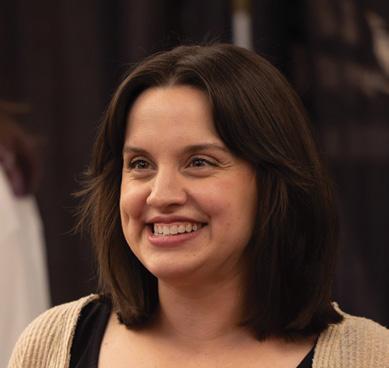
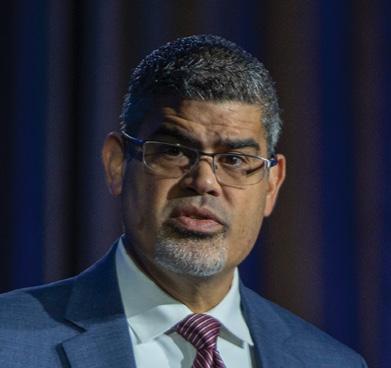

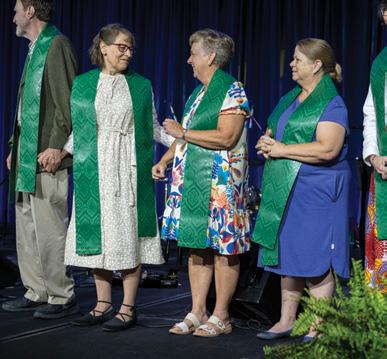
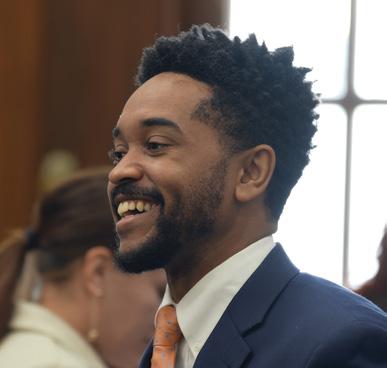
4 THE IMPACT OF GIVING
How Johns Creek Baptist Church inspired the congregation to change the way it gives, so the members could live more like Jesus
By Jennifer Colosimo
8 YOU BELONG HERE
Cooperative Baptists convene, connect and celebrate in St. Louis
By Carrie
Harris and Jeff Langford
16 FAITHFUL TO OUR ROOTS AS DISSENTERS
By Juan García
19
FIELES A NUESTRAS RAÍCES COMO DISIDENTES
Por Juan García
24 RETIRING FIELD PERSONNEL EMBODIED CBF’S MISSIONS IDEALS
By Marv Knox
28 CALLED IN
CONTEXT
Beyond a congregational context, Suprice’s ministry arc bends toward collegians
By Marv Knox
23 CBF AWARDED “BEST IN CLASS” FOR OFFERING FOR GLOBAL MISSIONS CAMPAIGN
FROM THE EDITOR

We are excited to share with you the Summer 2025 issue of fellowship! magazine. In this issue you will find a recap of the 2025 General Assembly, You Belong Here, that took place in St. Louis this June (pp. 8-15). You can read Rev. Juan García’s powerful and final speech given as CBF Moderator at General Assembly in English and Spanish (pp. 16- 21).
The 13 retiring field personnel were recognized at General Assembly, and you can read a summary of their combined 300 years of ministry by Baptist journalist Marv Knox, (pp. 24-27).
Jennifer Colosimo tells the story of Johns Creek Baptist Church, a group in the Cultivating Generous Congregations cohort. Their “Impact JCBC” initiative offers a new take on giving that prioritizes spiritual transformation rather than just tithing (pp. 4-5).
You can find a second piece by Knox on Benji Suprice, whose ministry to college students both through InterVarsity and his local church is an example of what it means to be Called in Context (pp. 28-31).
Finally, read the story of CBF’s “Best in Class” award won at the Religion Communications Council conference in Salt Lake City in April (p. 23).
As always, we hope you find this issue both thought-provoking and soul-stirring.
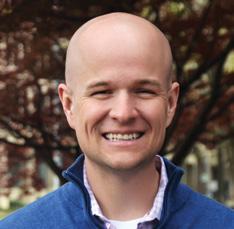

AARON WEAVER is the Editor of fellowship! Connect with him at aweaver@cbf.net
LAUREN LAMB is the Associate Editor of fellowship! Connect with her at llamb@cbf.net
THE IMPACT OF GIVING
By Jennifer Colosimo
How Johns Creek Baptist Church inspired its congregation to change the way they give, so they could live more like Jesus

LAST YEAR,
Shauw Chin Capps, president of the Cooperative Baptist Fellowship Foundation, began a deeper dive into the resources they provide Fellowship congregations. Whether churches are battling debt or hoping to grow, the Foundation already provides programming like congregational financial assessments, best practices, lessons for adult givers and sample stewardship calendars. They’ve helped guide many churches into the black and beyond. Part of that “beyond” is a cohort launched in 2022 called Cultivating Generous Congregations. This cohort is convened in partnership with the Lake Institute on Faith and Giving, and it invites church groups to develop “a healthy theology of generosity and understanding of the latest statistics and giving trends.”
Georgia’s Johns Creek Baptist Church is one of those groups. And they’ve gone all
in. Already working on something called an Impact campaign, they were able to take what they learned at the cohort to flesh out some of their goals and motivate their congregation from a place of informed stewardship. In addition to an annual impact report sent to the congregation, they have implemented more strategic and ongoing messaging about weekly offerings and curated a dramatic push among the congregation to increase giving in several different ways.
“We wanted to explore a broader conversation around stewardship development, seeking to learn best practices outside of our system,” said JCBC’s senior pastor, Shaun King. “We recognize that all genuine learning begins with ‘unlearning’ what previous best practices may have served well, but perhaps have outlived their effectiveness.”
They sent four church members to the

cohort last winter, including Connections Pastor David White; Carolyn Carter, the current stewardship chair; Bob Prator, JCBC’s treasurer; and Bret Hegi, the current assistant treasurer. Topics included ongoing stewardship education, how to develop members into donors, understanding generational giving motivation and more.
King said that honing a simplified and crystal-clear statement for the purpose of the ministry at JCBC was helpful. “We expressed our purpose in this way: We exist to share the transforming love of God. As such, we tethered every appeal for generosity to a reminder of that purpose. We were reminded of the power of personal experiences and storytelling. As we gleaned examples of God’s transforming love being experienced and encountered in the life of our congregation, we lifted up those stories in celebration and in a continued appeal to participate in that transformation through our generous giving.”
The Impact JCBC campaign is a great example to other churches of how they can implement more education around giving to encourage giving in all aspects of life, not just tithing. It began with the pastors at JCBC asking the congregation to complete a
“We exist to share the transforming love of God,” said Shaun King, senior pastor at Johns Creek Baptist in Alpharetta, Ga. Giving is seen in forms besides tithing, and the form of discipleship is growing.
deeply personal and challenging commitment card that asked how many Sundays they would commit to attending church, how many hours they would spend in service to others, how many families they would invite to join them at church in the coming year and, finally, how much they would increase their giving. While it addresses major areas within the church outside of financial giving, King feels that what they learned at the cohort helped undergird their campaign.
“When it became clear that God was ushering in a new season of authentic spiritual renewal within our congregation, our focus became crystal clear: ‘Making More and Deeper Disciples of Jesus,’” King said. “For the full sweep of a year we centered our congregational consciousness upon the call to deliberate church growth and authentic spiritual revival. We examined the scriptures to rediscover the promise of fruitfulness that would emerge from lives that were deeply rooted in practicing the way of Jesus in the world.
“Out of an ever-deepening desire to share that fruitfulness with the community and the world around us, we imagined what kind of impact our congregation might have if our singular priority were to grow deeper in
relationship with Christ and in the tangible practice of his way in the world.”
Since its inception, the campaign has carried a robust series of sermons from King and fellow pastors on the call to a deeper life of impact. They have celebrated as a church, and they continue to encourage and support their members in their commitments.
“The results have been inspiring,” King noted. “We have hosted testimonies in worship from individuals and families whose personal spiritual journeys have deepened because of their desire to have an impact in our church and in the world.”
Connections Pastor David White further explained that Impact JCBC helps people develop a focused commitment to spiritual formation and church growth.
“A number of things we learned from our participation in the Cultivating Generous Congregations cohort were valuable in our creative design and strategy planning,” he said. “Having an informed understanding of giving trends, generational proclivities, and the general state of religiosity in the United States was critical. Our learning was certainly helpful in shaping our Impact JCBC generosity strategy; but we were also able to modify much of what we learned to address
AN IN-PERSON CULTIVATING GENEROUS CONGREGATIONS COHORT IS SCHEDULED FOR NOVEMBER 15, 2025, AT FIRST BAPTIST CHURCH, GREENVILLE, SOUTH CAROLINA. FOR MORE INFORMATION, CONTACT BRADLEY BOBERG AT BBOBERG@CBF.NET.

commitment to faithful attendance, selfless service, and developing an invitational culture as well.”
King also mailed a mini-impact report to every single person after the first quarter, including a photocopy of their pledge card and the status of their financial giving to date. He’s holding them accountable—and those efforts are already bearing fruit.
King shared that one of JCBC’s seven core values is congregational courage, and what gives him the greatest sense of pride for the congregation is the willingness to try something new if it means the continued growth, health and vibrancy of the church and its gospel message.
“We have never asked our church to pledge anything beyond their financial contributions; and, frankly, that ask had run its course,” he said. “But calling on them to consider a pledge that encompassed the fullness of their lives may be making a difference. Those who may have been reluctant or intimidated to pledge financially in the past are asked to begin with what they can pledge in other areas of their lives. They can pledge being present and serving and inviting others into the life of the church. As they become more confident in these areas of discipleship, financial generosity becomes one more natural expression of the continued surrender of their whole life back to God.”
Giving is contagious, really. And the bug is catching—no matter what it looks like when they decide to start.


The
Sunday Serve
an opportunity for members of the
to gather to help the community by delivering food to those in need, visiting shut-ins, cleaning up landscaping and more.
Johns Creek Baptist’s group, the Sawdust Servants, serve the community by helping build ramps for people unable to access their homes.
JCBC members fellowship together (left) and serve together (above).
church hosted
Day,
congregation


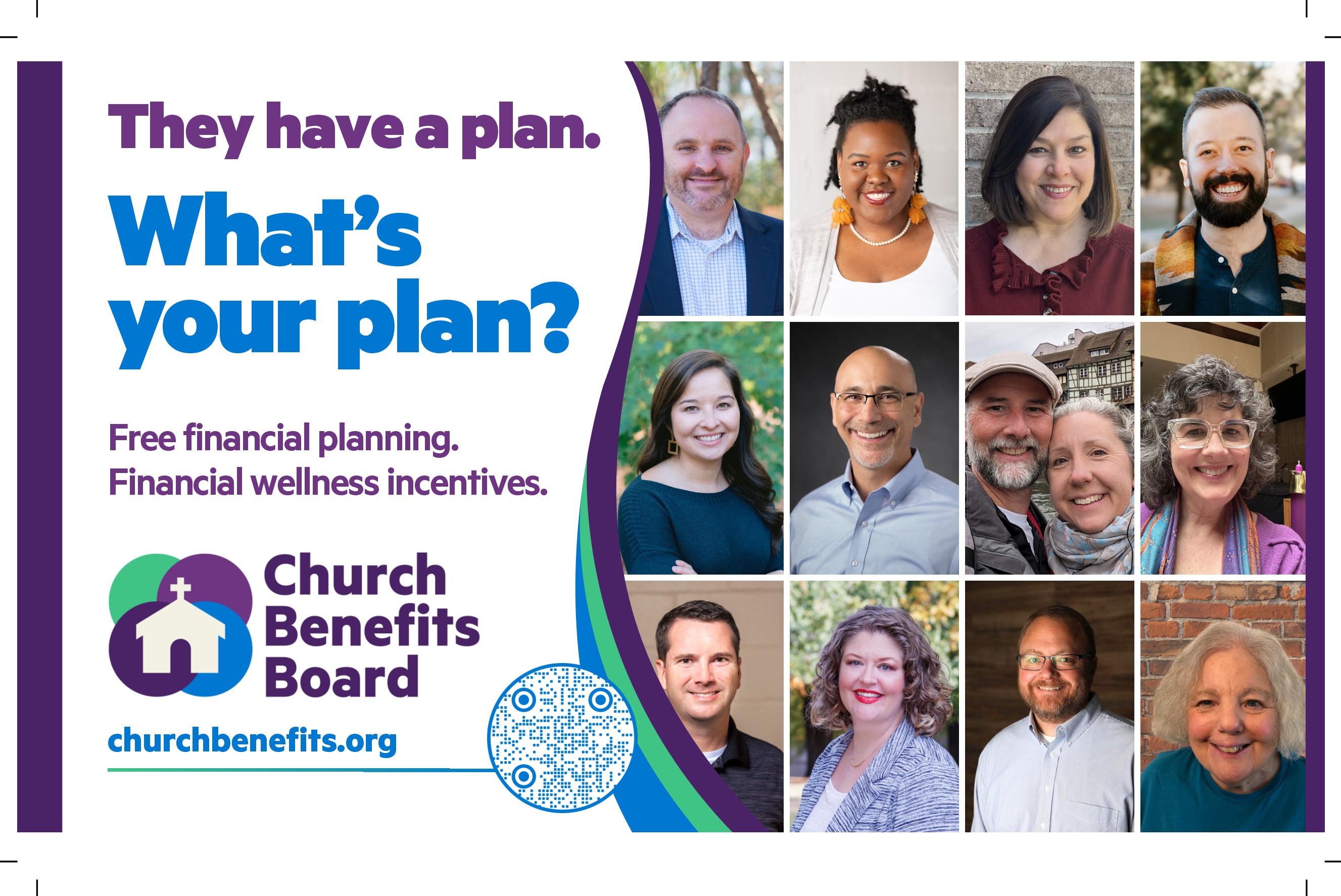


SUBSCRIBE
Stay
tuned in!
Sign up for CBF’s weekly newsletter to learn about the latest events, mission updates and stories happening within the Fellowship.
By subscribing, you’ll receive an email each Monday, Fellowship Weekly, that will bring you the latest CBF news. Signing up is simple—scroll to the bottom of our home page at www.cbf.net and click the bright green SUBSCRIBE button.
You Belong Here: Cooperative Baptists convene, connect and celebrate in St. Louis
by Carrie Harris and Jeff Langford
So then you are no longer strangers, but you are fellow citizens with the saints and members of the household of God, built on the foundation of the apostles and prophets, Christ Jesus himself being the cornerstone, in whom the whole structure, being joined together, grows into a holy temple in the Lord. In him you also are being built together into a dwelling place for God by the Spirit.
Ephesians 2:19-22
June 24-26, nearly 1,250 Cooperative Baptists gathered at the CBF General Assembly in St. Louis to both explore and experience belonging.
Held for the first time in CBF’s Heartland, those gathered in the Gateway City were welcomed with open arms and warm hearts from the region’s 25 partner congregations, 70 CBF-endorsed chaplains and hundreds of ministers and lay leaders across the 12 states that comprise the region.
This three-day-plus event offered opportunities for learning, worship and connection—exploring the theme of belonging through hospitality, justice, inclusion, innovation and Baptist principles.
The Assembly began with a leadership session keynoted by pastor and political scientist Ryan Burge, followed by an energetic Opening Party and LateNight Worship, sponsored by CBF’s Pan African Koinonia (PAK) where Rev. Dr. Charles E. Goodman, Jr. invited attendees to reflect on spiritual rootedness.
The Assembly also conducted important business: new CBF governance leaders were elected, retiring field personnel were honored and awards were presented to outstanding contributors. These moments provided opportunities to celebrate legacy, mark transitions and invest in the organization’s future.
In a stirring address, outgoing moderator Juan García issued a challenge to the Fellowship—calling Baptists to “faithful dissent” against ideologies that supplant Christ with nationalism or political power. Complementing that call, Rev. Melissa Hatfield invited all to “wade in” deeper, urging CBF to imagine and affirm a broader, more inclusive welcome within their shared faith.
Civic engagement took center stage with a new initiative launched at the CBF Advocacy Breakfast, encouraging congregations and individuals toward faithful Christian citizenship on issues such as racial justice, public education and abuse prevention. This dovetailed with the annual Dr. Emmanuel McCall Racial Justice Trailblazer Luncheon, which honored racial justice trailblazers for their leadership and vision.
The Assembly closed as it began—with a Spirit-filled atmosphere full of inspiration and renewal. In his closing sermon and address to the Fellowship, Executive Coordinator Paul Baxley reminded the Assembly that in Christ we all belong and are sustained, forming a living community bound together by Jesus as “the first stone and the last stone.”
You can catch up on all the news, photos and videos from the Assembly at www.cbf.net/general-assembly-25
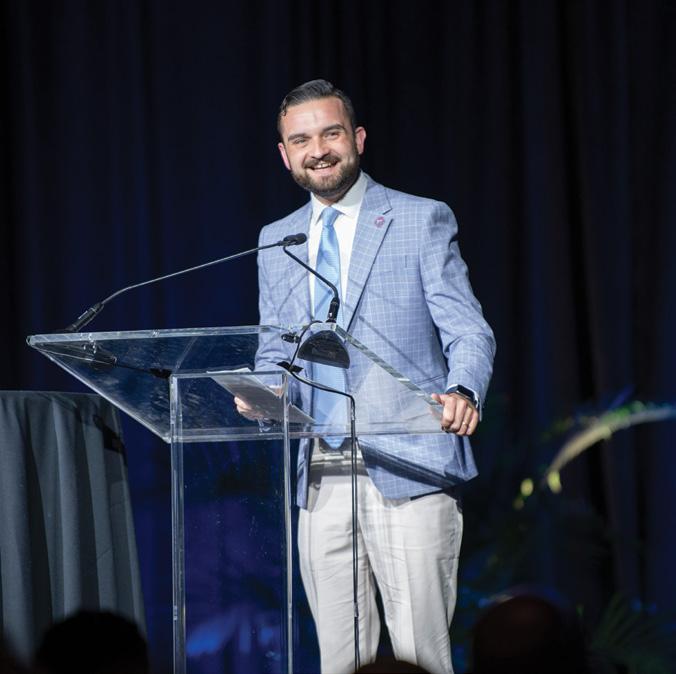
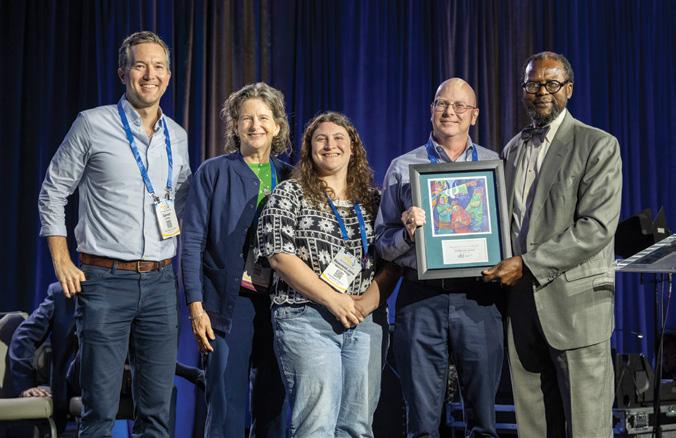
Through worship, plenary and business sessions, Cooperative Baptists had opportunities to hear from leaders across the Fellowship and celebrate churches doing great work, like Woodland Church in San Antonio, Texas, who received a Mission Excellence Award (pictured above).

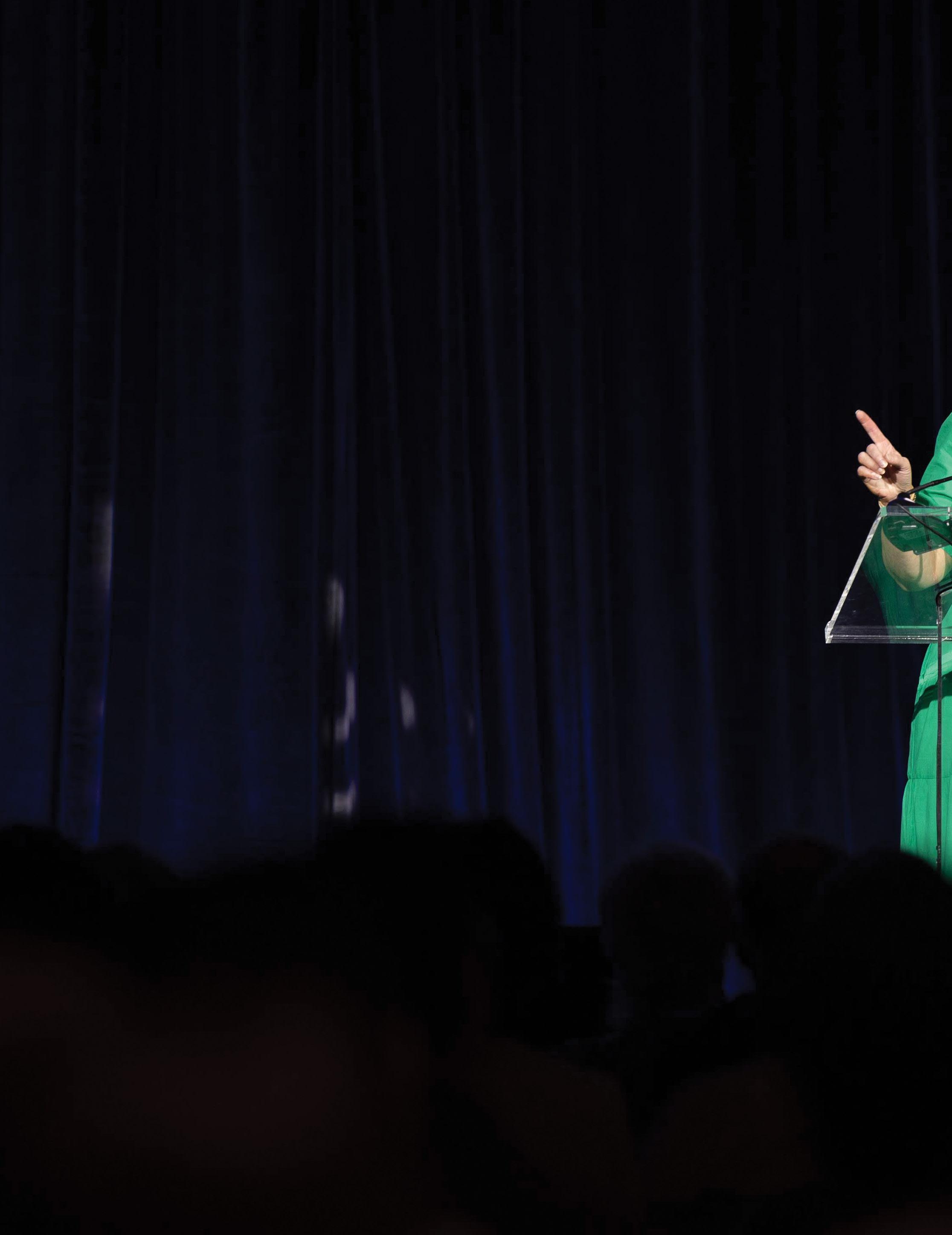



During the Assembly, Cooperative Baptists gathered to worship through song, reflection, prayer, challenging sermons and through the Lord’s Supper, led by Jason Edwards (left), Senior Pastor of Second Baptist Church in Liberty, Mo., and Lita Sample (right), CBF field personnel serving in California.
Attendees heard sermons from Melissa Hatfield (left), Lead Pastor of FBC Jefferson City, Mo., and CBF Executive Coordinator Paul Baxley (lower right).

(Below) The Awakening praise band from First Baptist Church in Columbia, Mo., led by Shelby Pride, were the music leaders for the Assembly, calling on Cooperative Baptists to worship through song.

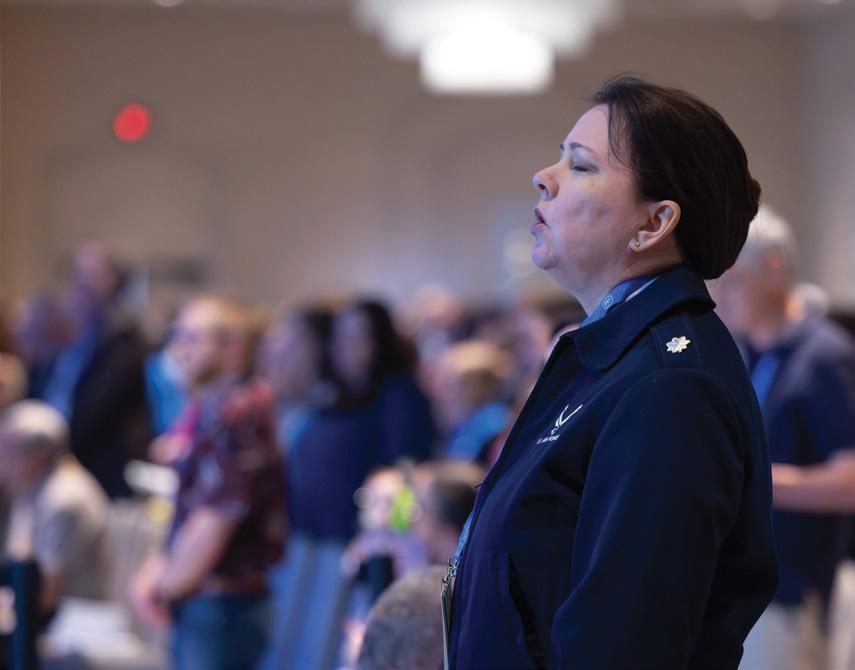



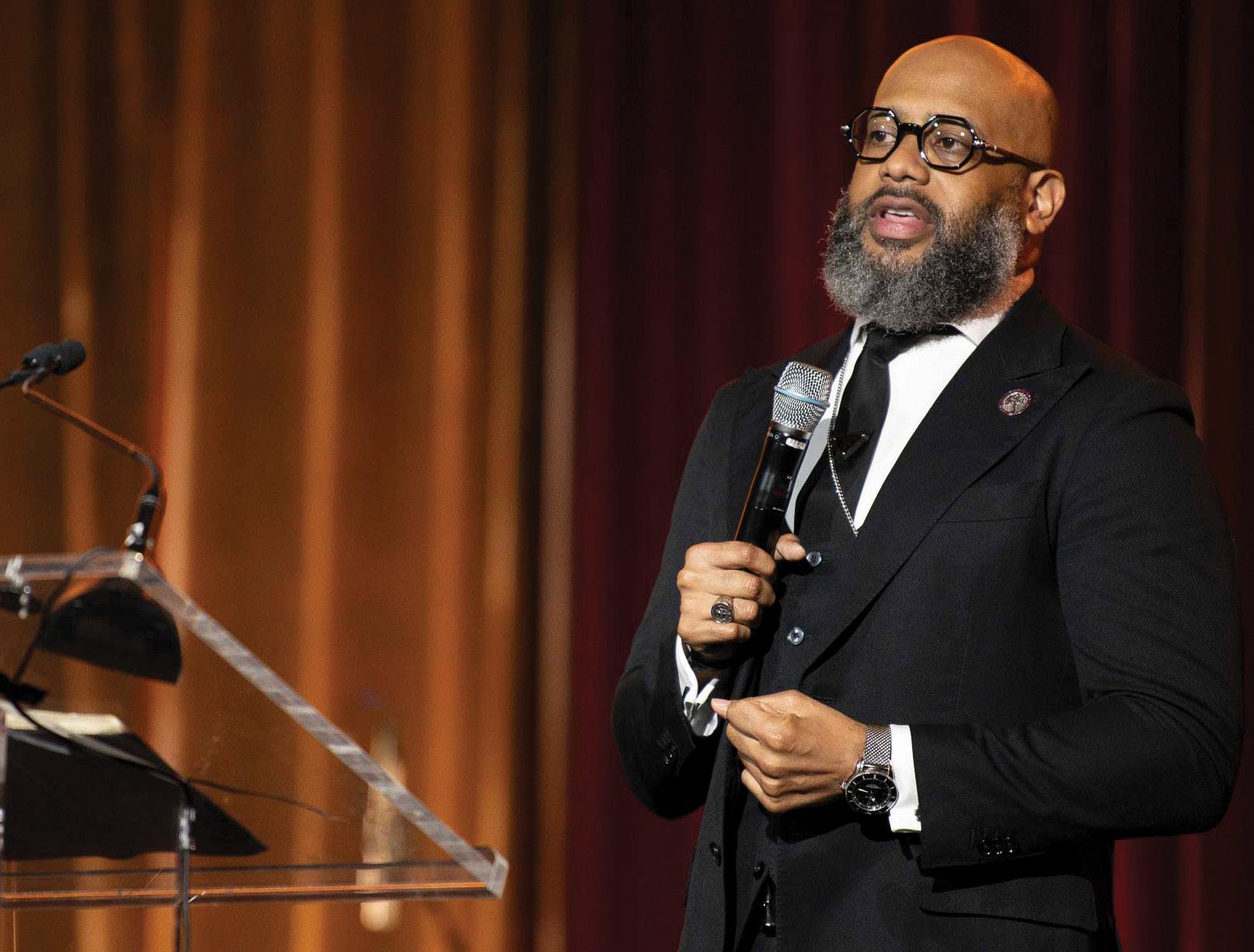


Jennifer L. Kelley (above), Director of Worship, and musicians from Central Baptist Church in St. Louis, led the Late Night worship service and called participants to energetic praise through song.
Late Night services trace their roots to the first Watch Night service on December 31, 1862, when enslaved people gathered in worship late into the night, watching and waiting for news of President Lincoln’s signing of the Emancipation Proclamation. Now an annual tradition at the General Assembly, CBF’s Pan African Koinonia hosts this vibrant worship service late in the evening to participate in that tradition.


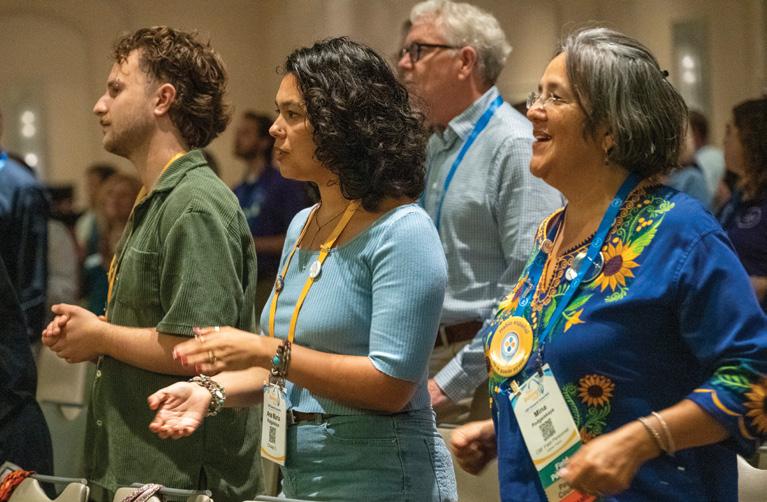
Dr. Charles Goodman Jr., Senior Pastor and Teacher of the historic Tabernacle Baptist Church in Augusta, Ga., called Late Night worship attendees to focus on the test of Jeremiah 17:8.
(Below) Leaders from Fellowship Southwest accepted a Dr. Emmanuel McCall Racial Justice Trailblazer Award, celebrating their work in racial justice and their ongoing public witness for justice— particularly along the United StatesMexico border.
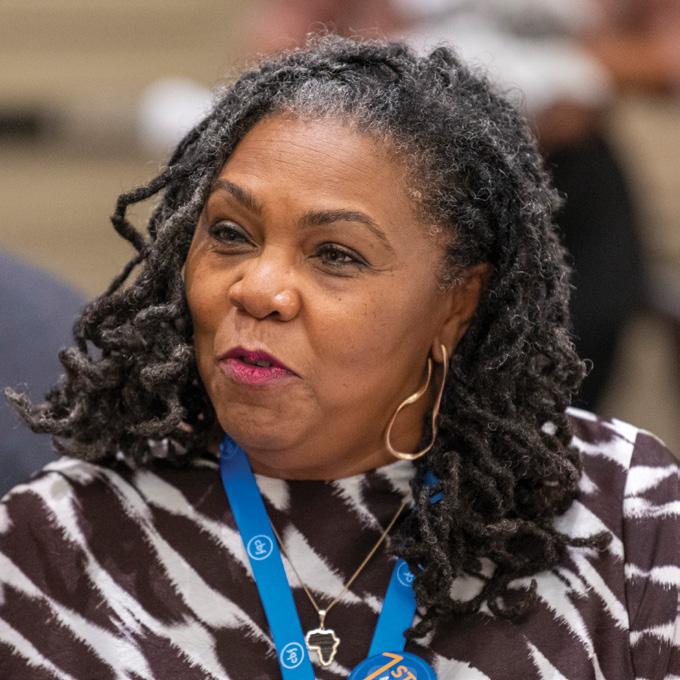


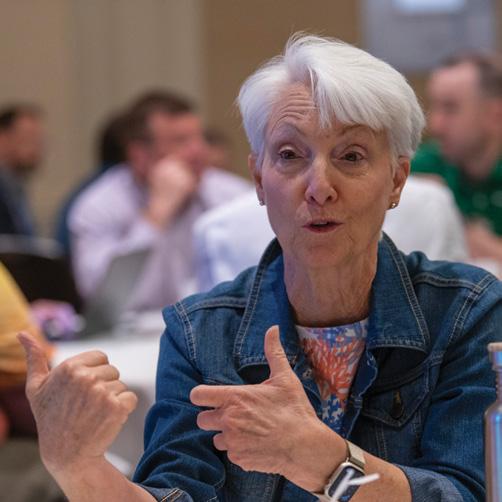

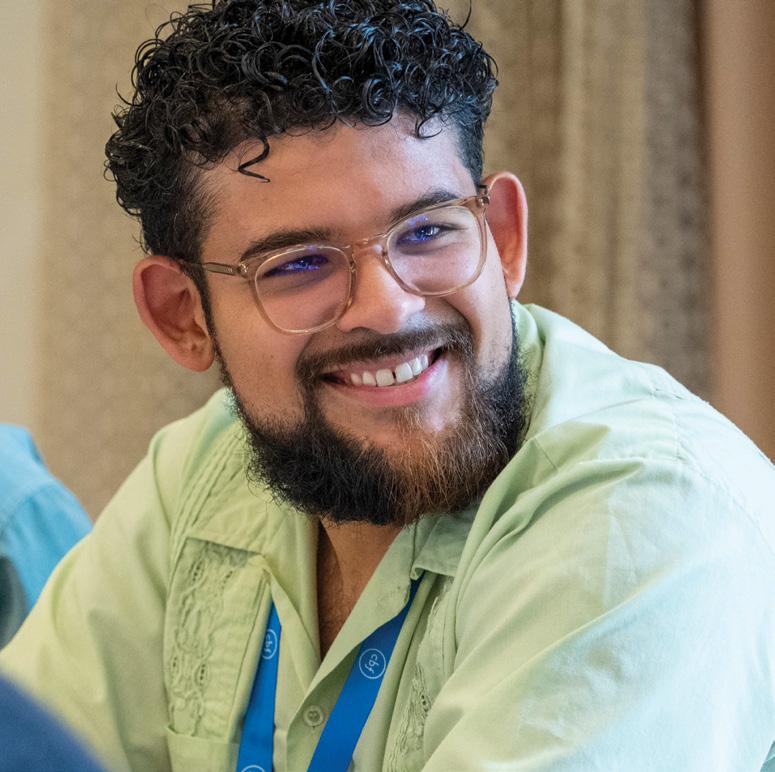
(Left) Rev. Traci Blackmon, CEO & Founder of HopeBuilds, LLC, theologian-inresidence at Eden Theological Seminary and chaplain for the Central Region of Alpha Kappa Alpha Sorority, Inc., served as the keynote speaker for the Dr. Emmanuel McCall Racial Justice Trailblazer Luncheon, calling on Cooperative Baptists to wake from complacency, confront systems of injustice and reclaim the liberating call of the Gospel.

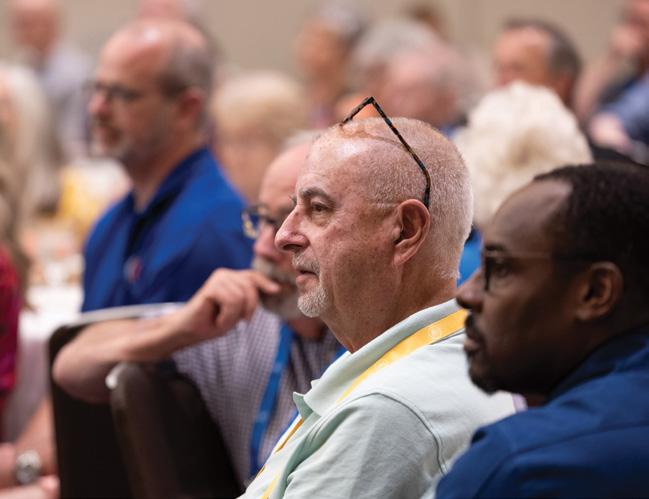
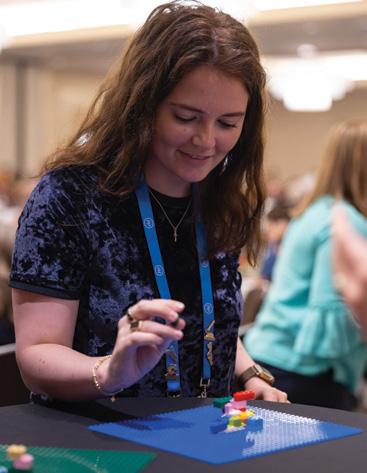
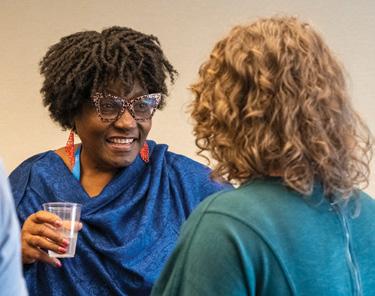

Meal events throughout the Assembly provided opportunities for attendees to connect around tables and with partner organizations. During meal events, participants heard from keynote speakers including Rev. Traci Blackmon; author Rev. Angela Denker; President and CEO of the Interfaith Alliance, Rev. Paul Raushenbush; and author Rev. Dr. Robert P. Jones.
The General Assembly is full of opportunities to connect across boundaries, bringing a diverse community of Baptists together to learn and grow together, fellowship and network, have meaningful conversations and have fun.
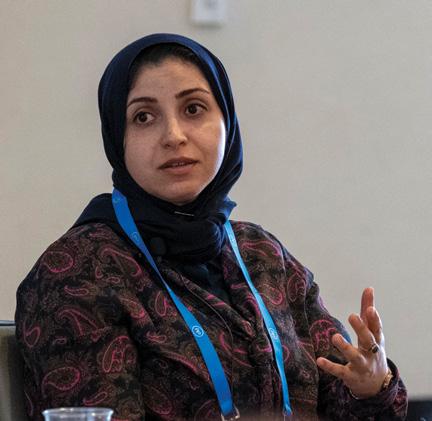

On Wednesday and Thursday afternoon, Assembly attendees had the opportunity to participate in 36 Learning Labs and a Thriving Excursion. Through conversation, hands-on learning and panel discussions, Cooperative Baptists engaged with leaders across the Fellowship focused around topics including resilience, financial wellness, inclusion, multi-generational ministry, missions and leadership.

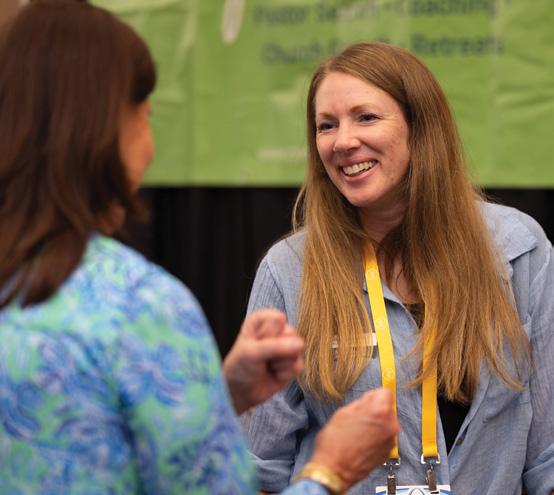
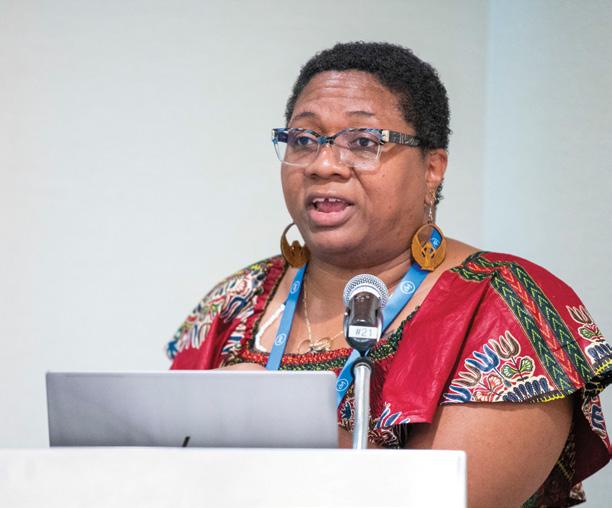
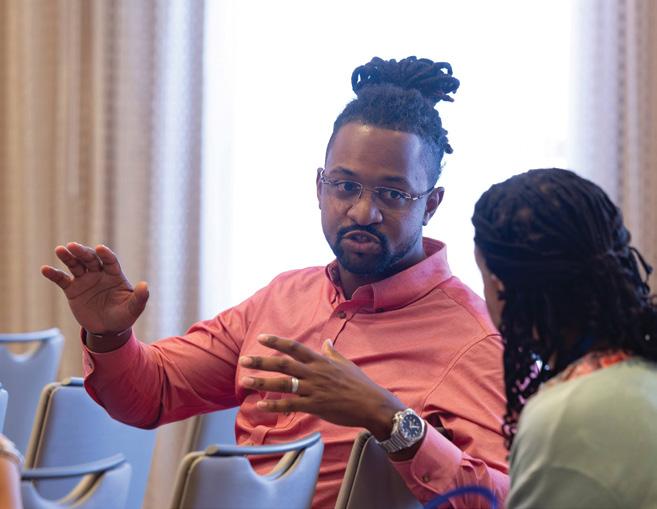

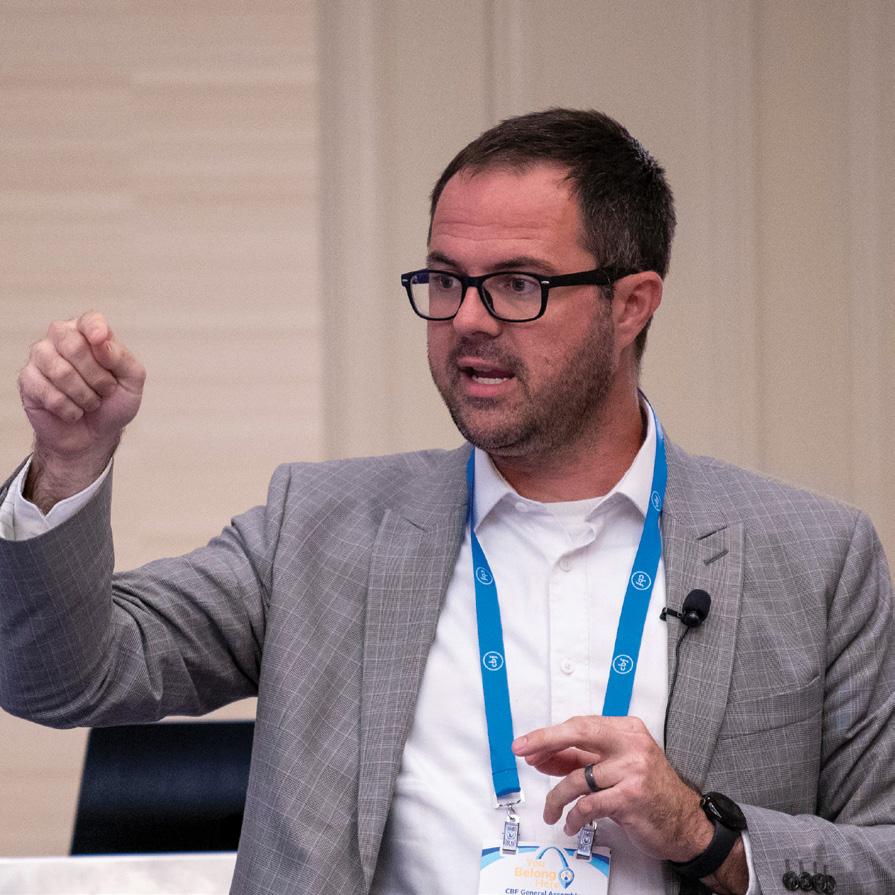

Ryan Burge (above), an associate professor of political science at Eastern Illinois University, led a Leadership Conversation addressing church growth, demographic shifts and pastoral challenges. Drawing from personal experience and data, Burge encouraged attendees by acknowledging that many churches aren’t growing—and that’s okay.


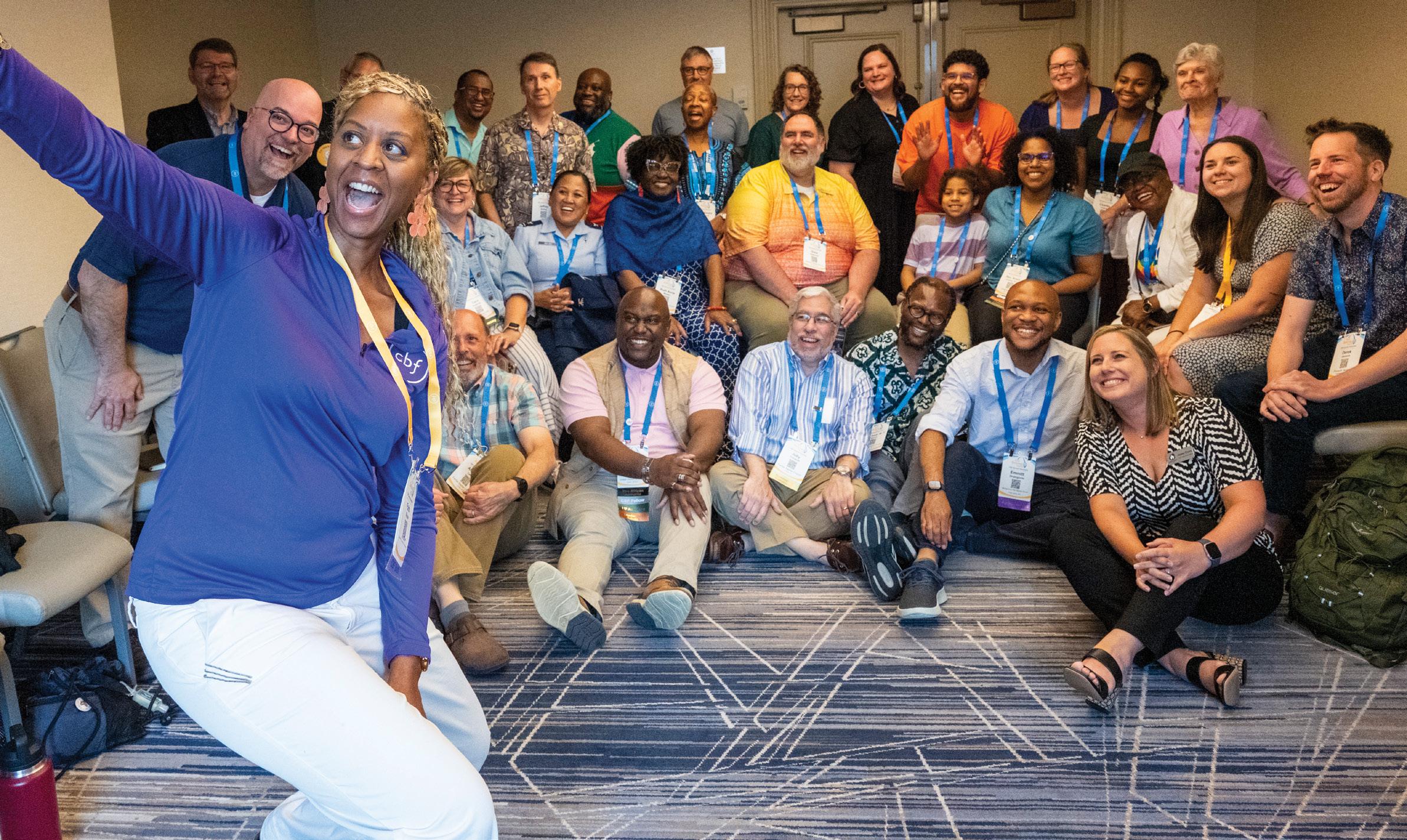
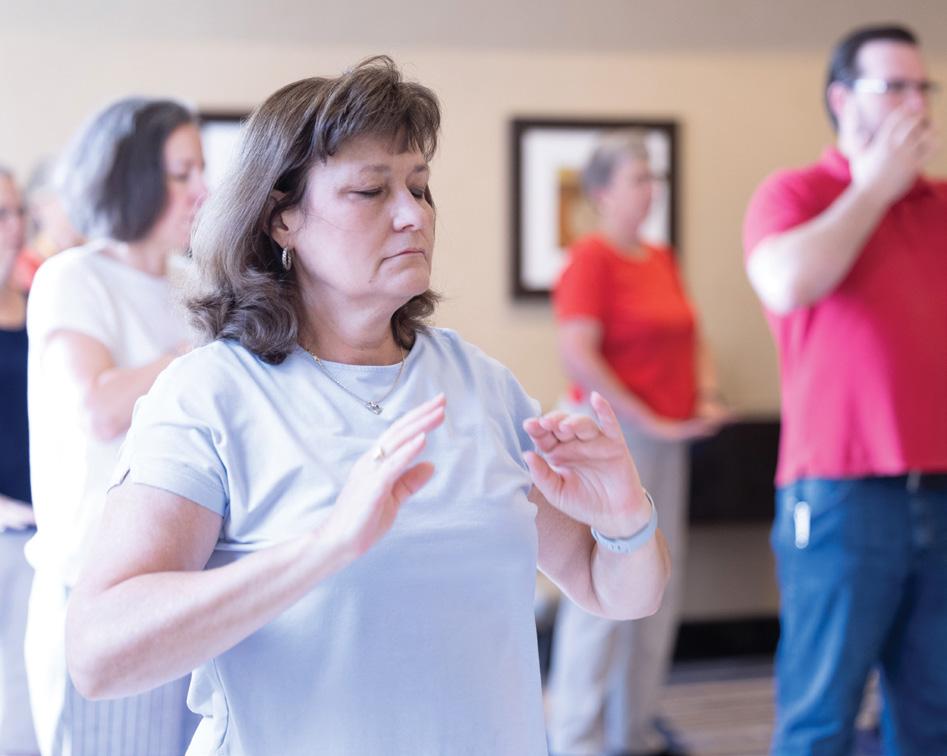

Attendees from Mid-Atlantic CBF (MACBF) and Baptist Fellowship of the Northeast (BFN) gathered and posed for a selfie with new Coordinator of BFN, Faith Bynoe.


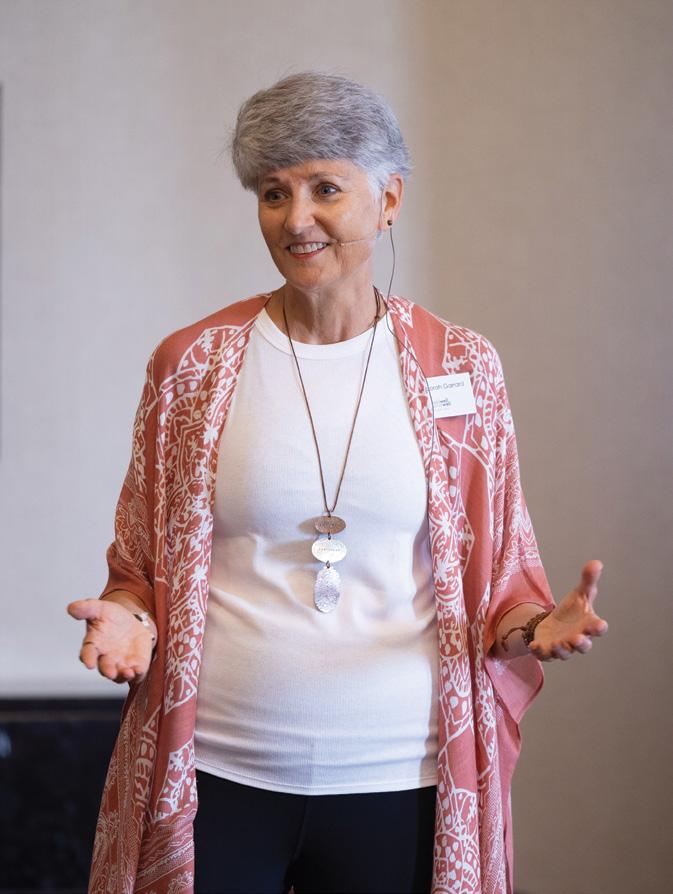
Deborah Garrard, Executive Director and Lead Coach for be(e) well serve well, led Cooperative Baptists in morning meditations, focused on centering through breath and movement, as well as centering through vibrational sound—offering moments of peaceful relaxation and connection with self and with others before busy days at the Assembly.
The General Assembly creates opportunities for connection, with the theme of “You Belong Here,” attendees could find their sense of belonging through state and regional gatherings, large group sessions, moments of connection and conversation in a hallway, learning labs and beyond.
(Left)
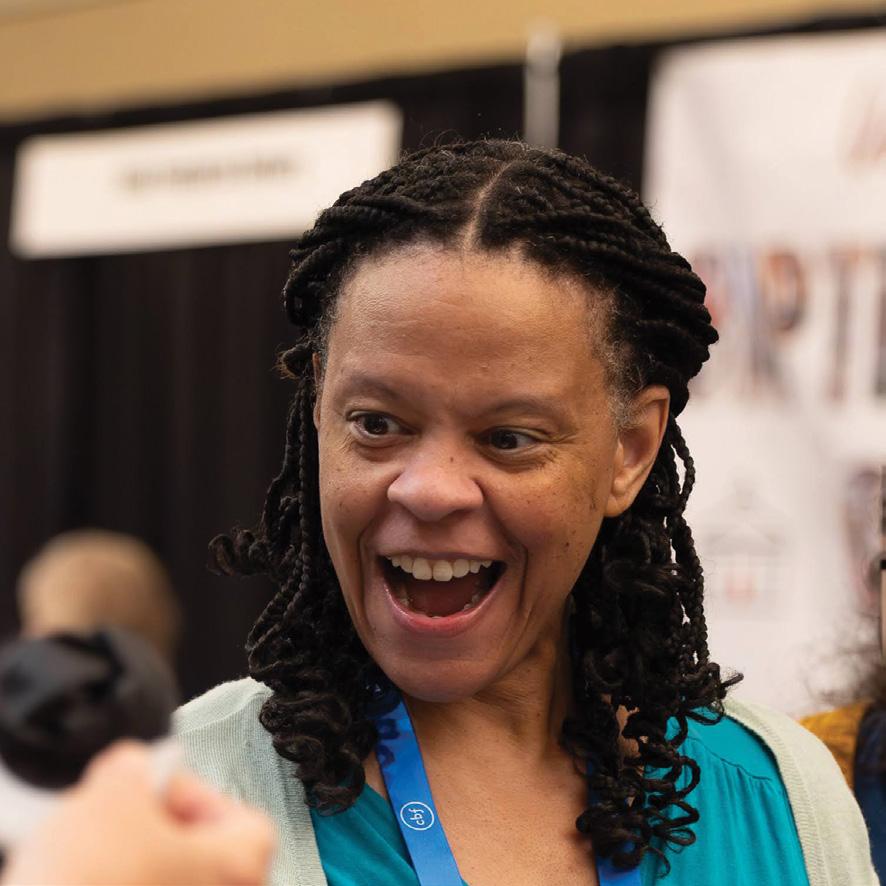
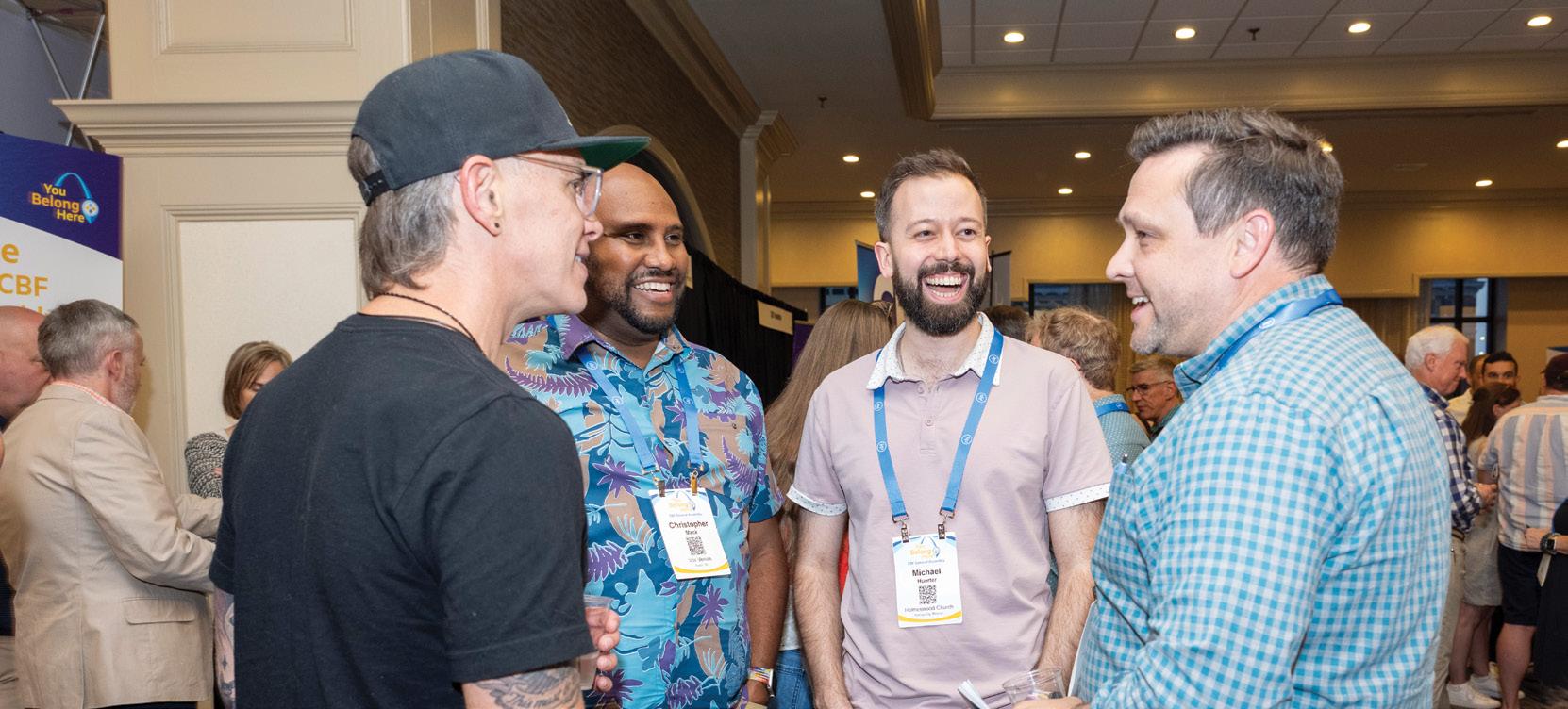
The Gathering Place served as a hub for activity and connection throughout the Assembly, with more than 40 sponsors and exhibitors making connections with Cooperative Baptists.



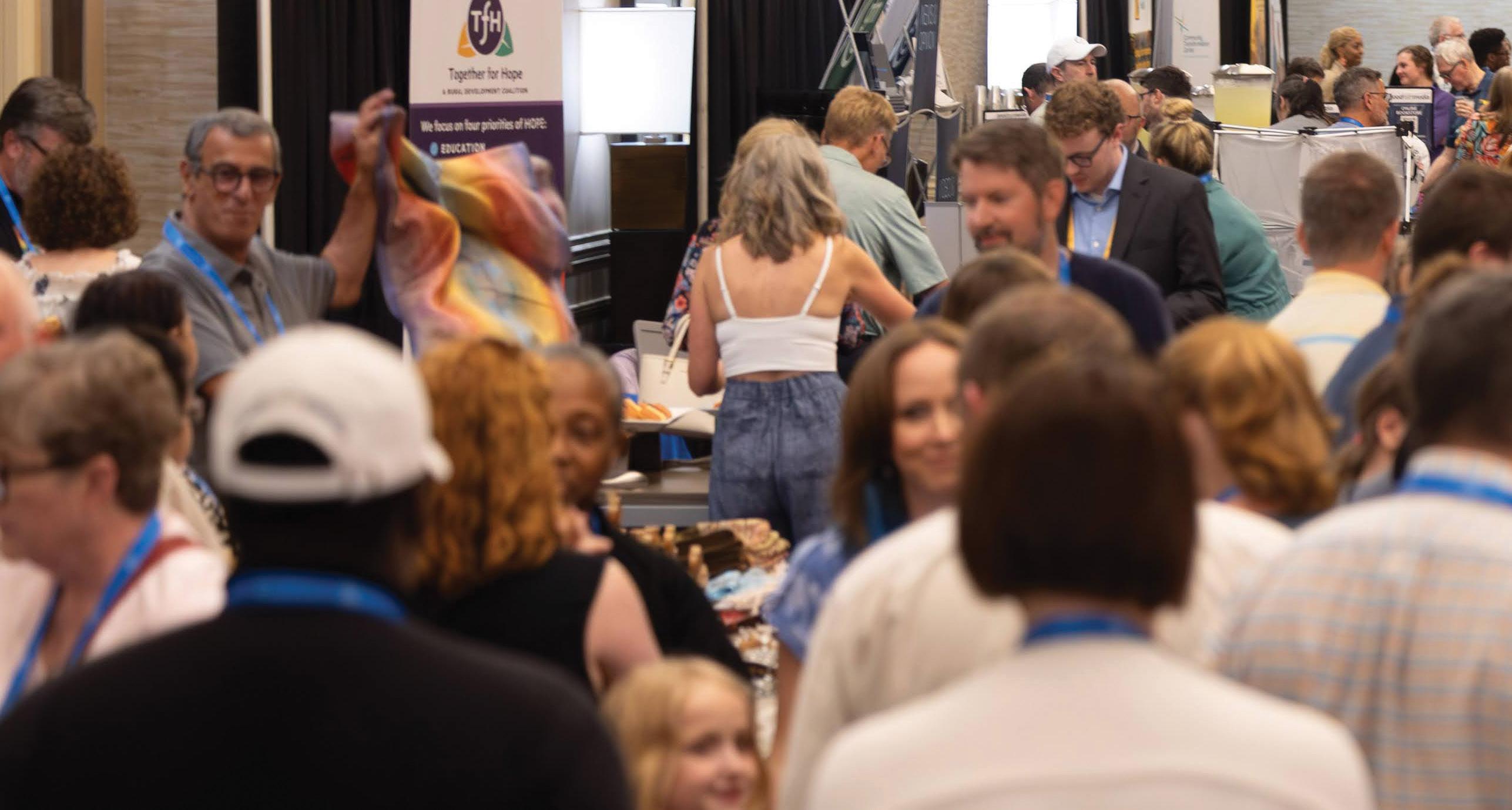
The Assembly kicked off with a party throughout The Gathering Place, offering attendees an opportunity to reconnect with each other and connect with partner organizations and exhibitors. Throughout the week, Cooperative Baptists returned again and again to connect, network, shop, catch a live recording of the CBF Podcast or attend a book signing.

JOIN US
for the 2026 General Assembly in Jacksonville, Fla. at the Hyatt Regency Jacksonville Riverfront JUNE 17-19, 2026!



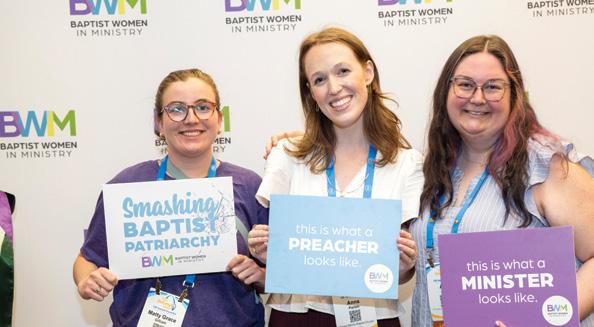




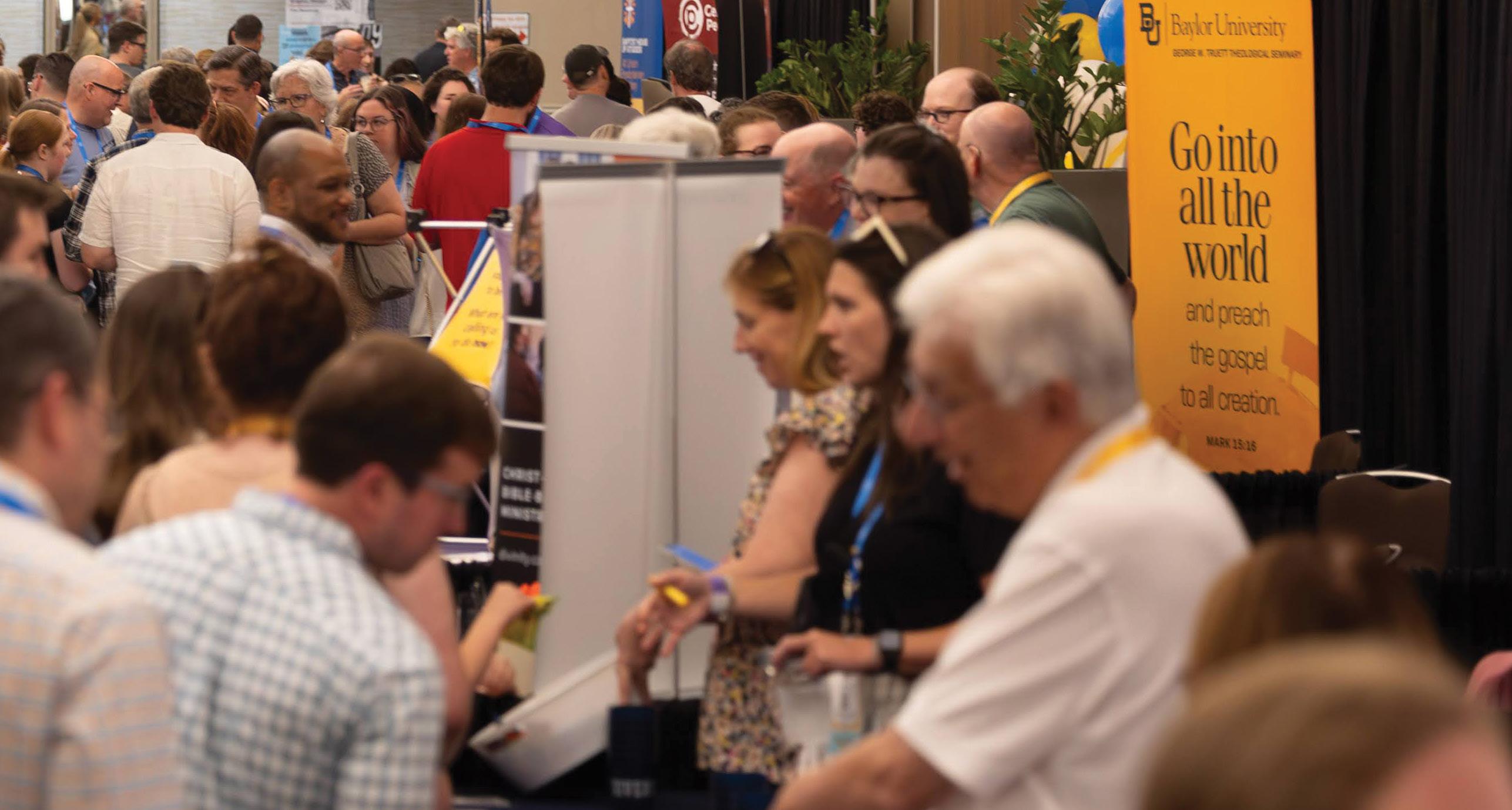
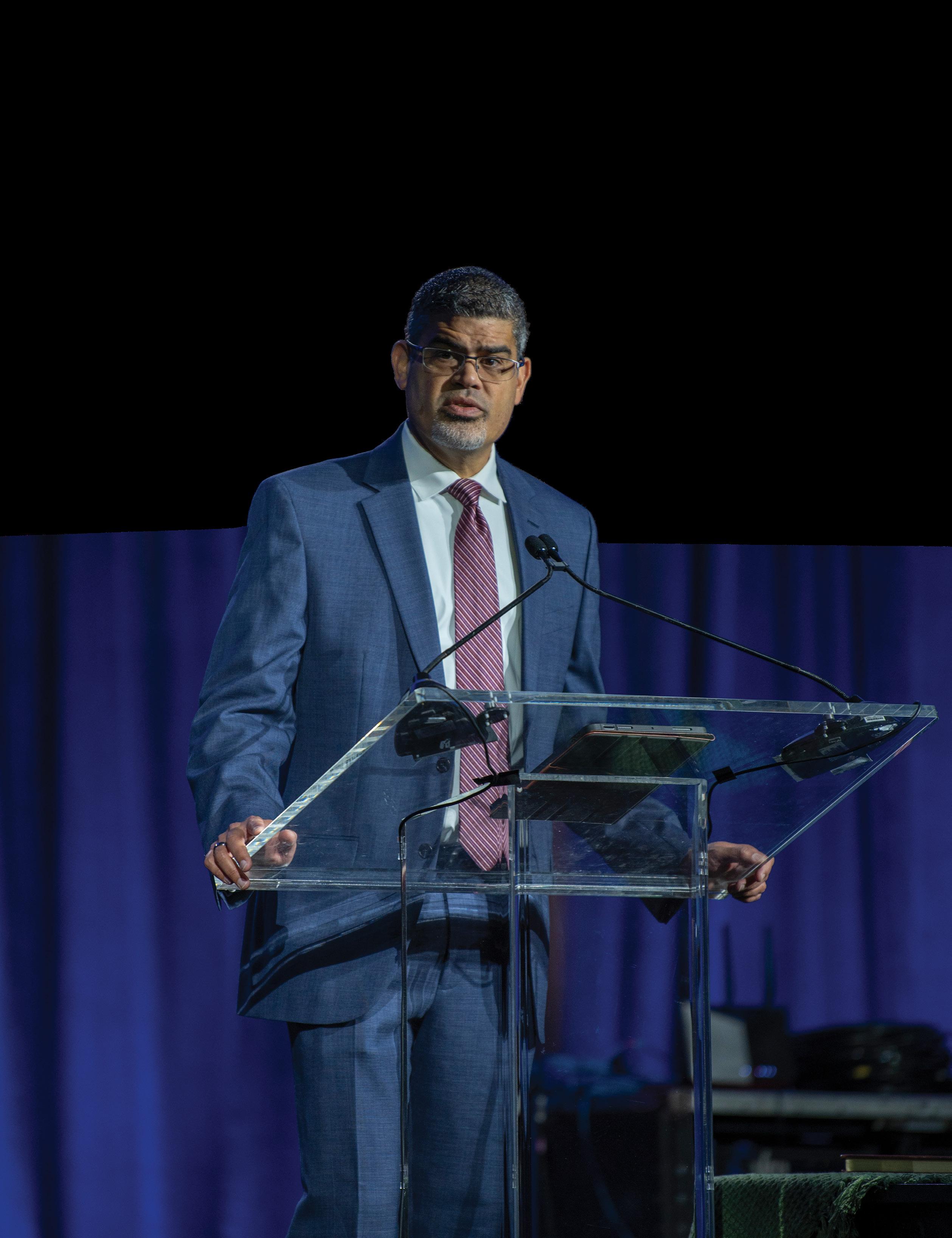
At the 2025 General Assembly in St. Louis, Rev. Juan García delivered his final address as CBF Moderator in Spanish, a stirring challenge to Cooperative Baptists to embrace their heritage as dissenters and act with courage in the face of injustice. Read his speech below.
“I can’t believe a year has already passed—and what a year it has been! A year full of challenges and, at the same time, opportunities to show who we are as the Cooperative Baptist Fellowship to a world that desperately needs the kind of Christian witness that only we are equipped to offer. For me, it has been a privilege to serve this year as moderator, and to work alongside our executive coordinator during the complicated and challenging socio-political moment we are going through.
I want to let you know how proud I am to belong to this family of faith. A family that values its field personnel and the years of hard work they’ve dedicated to the cause of the gospel. A family of faith that is not afraid to make the difficult and important decisions that must be made, but does so with love, with grace, with respect, with dignity—as a community that cooperates for the common good.
I want to take the opportunity to say to all our field personnel—to those who opted into the Early Retirement Incentive Program as well as those who continue to serve— thank you! Thank you for responding to God’s call. Thank you for your dedication and for all the years of service you’ve invested in proclaiming the Gospel of Jesus Christ. Your presence, your work and the impact you have had—and continue to have—for the Kingdom of God in our world is our best cover letter. Thank you!
I want to highlight something important and courageous that we did this year. In our commitment to religious liberty, local church autonomy and the separation of church and state, we decided to join a legal action to restore protections for “sensitive locations”—protections that have allowed our congregations to worship and minister
freely without fear of being interrupted by the government.
This decision was especially meaningful for me as pastor of a Latino immigrant church that felt the impact of the abrupt and inhumane changes to immigration policy brought on by the current administration. I want to thank our advocacy team for working diligently on this, and I want to thank our governing board for unanimously voting in favor of this action.
Now, let us not think that what we did was a rarity— something unprecedented. By no means! This is precisely what it means to be a Baptist follower of Christ. This is what has characterized us from the beginning. At the heart of our Baptist identity is a commitment to dissent. We have always been a people who, when faced with injustice, corruption and coercion—whether from the state, the church or society—choose the path of conscience, the path of conviction, the path of Christ.
Our ancestors dissented against the idea that governments should control the church. They dissented against the notion that faith could be imposed by force instead of freely chosen. They opposed systems that denied the dignity of every believer, insisting instead that each person stands before God with the freedom and responsibility to seek truth.
That dissent was costly. Many of our ancestors were persecuted, imprisoned and even killed for their convictions. Yet their courage paved the way for us to be gathered here today, worshiping and living our faith freely.
Dissenting is not about rebelling for rebellion’s sake. By no means! Dissenting, for those who follow Christ, is an act of faithfulness: faithfulness to the gospel, to Christ’s call and to the sacred worth of all
people. And in this sociopolitical moment we are living through, we must ask ourselves: Where is God calling us to bear faithful witness, even when such testimony might cost us?
Brothers and sisters, we are called to dissent against any ideology that seeks to replace Christ—his way, his truth and his life—with political power, nationalism, lies or fear. As true Baptists, we must oppose any attempt to co-opt the gospel for political gain or to use the name of Jesus as a weapon instead of proclaiming him as good news for the oppressed, the poor and the marginalized.
We are called to dissent against systems that exploit and exclude. This dissent is not optional—it is foundational to those who follow Christ, who embraced and included all, especially those whom social systems rejected and excluded.
Today, we must ask ourselves: Will we defend the dignity of immigrants, the hungry, the homeless, the poor, the elderly, the marginalized—those being dehumanized and demonized by elected officials? Will we stand firm with the Gospel of Jesus against the injustices that our elected officials are committing—or allowing to happen—against the least of these, who are mostly people with black or brown faces?
Will we have the courage to speak truth to power when discriminatory laws and practices are falsely presented as “protection” or “national security”? Will we claim and uphold our heritage as people who stand for what is right—not for political convenience, not only when it’s safe to do so, not only for ourselves and those who look like us, but for all God’s children, regardless of their origin, nationality or circumstance?
I know that as a Fellowship we have a history of fighting for justice. We have raised our voices and taken action on numerous occasions. But we can do more.
We are called to dissent against complacency in our own churches. It’s easy to get comfortable, to let fear of conflict and its repercussions keep us from speaking and living the truth of the gospel with boldness. But our faith is not meant to be passive or to preserve the status quo. The same Spirit that gave courage to the prophets, that stirred the early Baptists to defy kings and that moved those who founded this Fellowship in the 1990s, is in us and with us. So, let us allow the Spirit to continue to work freely and transformatively through us today.
Brothers and sisters, being a dissenter is not easy. It requires courage, wisdom, conviction and deep dependence on the Holy Spirit. But we do not walk this path alone. The Lord Jesus himself was the greatest dissenter—challenging the religious and political powers of his time, refusing to bow to empire, lifting the lowly and calling his disciples to a kingdom of love, justice and peace that looked nothing like Rome and its so-called Pax Romana.
Cooperative Baptist Fellowship, this is the moment to rise with courage, lift our voices and act. This is the moment to demonstrate that our primary, fundamental and ultimate allegiance is to Christ, his Lordship and his Kingdom. This is the moment to stop living a comfortable and safe gospel. This is the
moment to unite ourselves as one body of Christ against injustice and denounce what is wrong, unjust, immoral and anti-Christ in our society—whether it comes from the left or comes from the right. This is the moment to hold fast to our Baptist roots and dissent with respect and conviction.
And yes, it may cost us—but what is the alternative for us who are called to live on earth as citizens of heaven? To remain silent? To allow the oppression and injustice that are affecting all of us to continue? To speak of having faith in Christ, but not living according to it? That would be to live what Dietrich Bonhoeffer called “cheap grace,” which he described as “grace without following Jesus, grace without the Cross, grace without Jesus Christ, living and incarnate.”
What kind of example of faith would that be for future generations? In fact, how could we look our own children and grandchildren in the eye and instruct them in the faith if what they see from us is a dead faith—a cowardly faith—a faith that takes no action—a faith that does not look like Christ? Yes, it may be costly, but there is much at stake.
Now, let us not wait until everything that is happening affects us personally to finally stand up to advocate and dissent. Don’t wait until it touches your finances, threatens your job or disturbs your comfort, your privilege and your future to then decide to act. No! That would be pure selfishness and hypocrisy.
Stand up because you know it is just and right, even if it’s not the most popular thing. Do it in solidarity with your neighbor, understanding that the wellbeing of each person is the wellbeing of all. Act because there are sons and daughters of God— of different colors, languages, cultures, immigration statuses, genders and sexual identities—who as human beings have suffered injustice for years and have been impoverished, stripped of dignity and deprived of fundamental God-given human rights. Do it because you know it is what Christ would do out of love, all the way to Calvary.
Cooperative Baptist Fellowship, we are the church of the risen Christ. With his resurrection, a new day dawned, and our mission is to live in the light of this glorious reality. The Kingdom of God, which Jesus inaugurated with his life, death and resurrection, is one where everyone belongs, and it must be manifested in our world through us—the living, united and active church of Jesus.
So let us stand up with courage and determination. Let us be faithful dissenters, tireless defenders of justice and love, until we see God’s Kingdom fully unfolded among us—until God’s will is done on earth as it is in heaven. Let us show everyone out there, with our words and actions, that they belong here. This is our calling, our privilege and our responsibility. Our time is now. Let us then seize our moment! Thank you!”
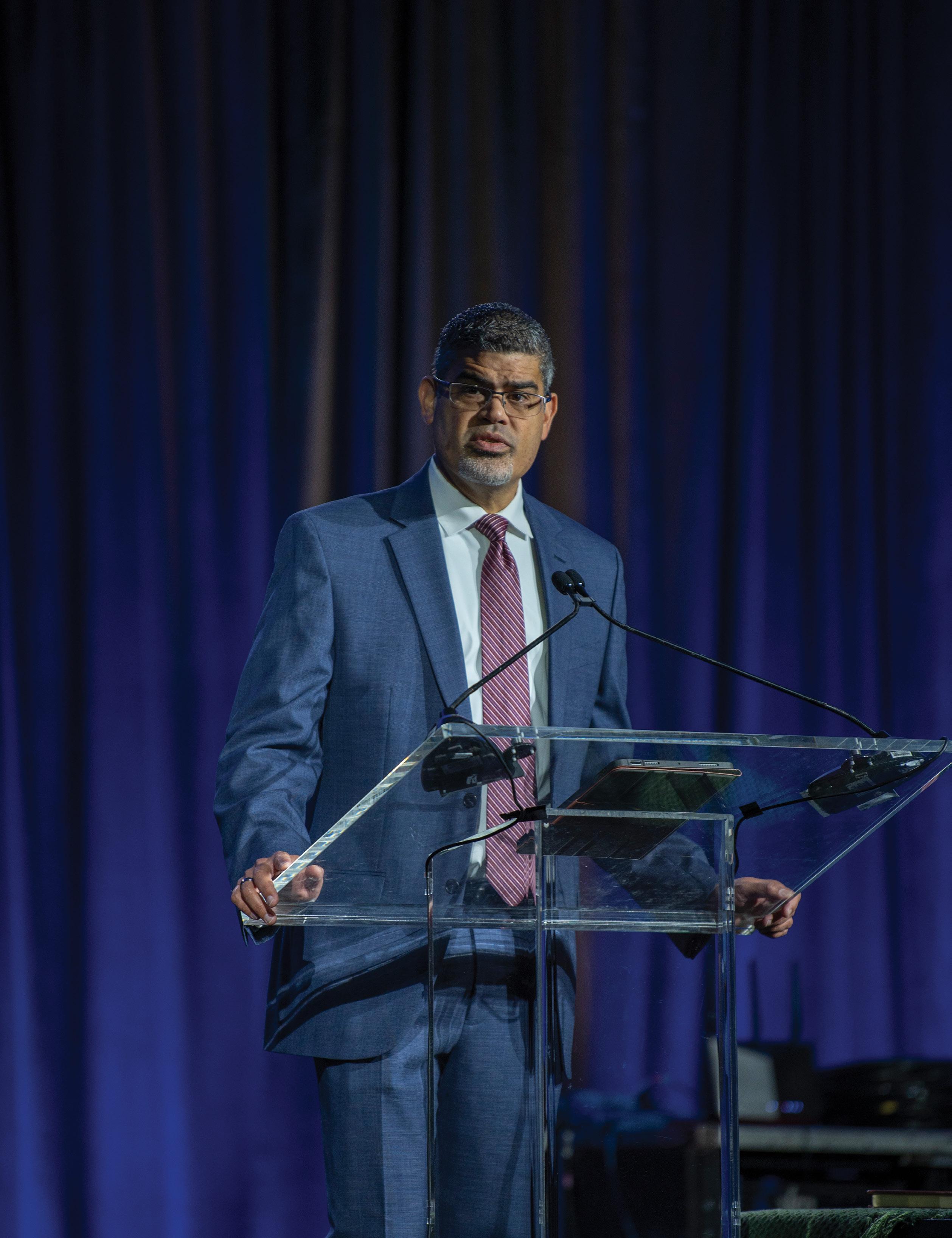

En St. Louis, durante la Asamblea General de 2025, el reverendo Juan García pronunció su último discurso en español, un conmovedor desafío a los Bautistas Cooperativos para que acepten su herencia disidente y actúen con valentía ante la injusticia. Lea su discurso a continuación.
“No puedo creer que ya pasó un año, y ¡qué año ha sido! Ha sido un año lleno de desafíos, y a la vez de oportunidades para demostrar quienes somos como Compañerismo Bautista Cooperativo para un mundo que necesita la clase de testimonio Cristiano que solamente nosotros estamos equipados para dar. Para mí ha sido un privilegio el poder servir este año como Moderador, y trabajar junto a nuestro Coordinador Ejecutivo, durante una etapa sociopolítica tan compleja y desafiante como la que estamos viviendo.
Quiero dejarles saber lo orgulloso que me siento de pertenecer a esta familia de fe. Una familia de fe que valora a su Personal de Campo y los años de arduo trabajo dedicados a la causa del evangelio. Una familia de fe que no teme asumir las decisiones difíciles e importantes que deben tomarse, pero que lo hace con amor, con gracia, con respeto y con dignidad—como una comunidad que coopera por el bien común.
Quiero aprovechar la oportunidad para decirle a todo nuestro personal de campo—a los que se acogieron al Programa de Incentivo a la Jubilación Temprana, como a los que todavía continúan sirviendo: ¡Gracias! Gracias por responder al llamado de Dios. Gracias por su dedicación y por todos los años de servicio que han invertido en la proclamación del Evangelio de Jesucristo. Su presencia, su trabajo y el impacto que, para el Reino de Dios, han tenido y están teniendo en nuestro mundo es nuestra mejor carta de presentación. ¡Gracias!
Quiero resaltar algo importante y valiente que hicimos este año. Fieles a nuestro compromiso con la libertad religiosa, la autonomía de la iglesia local y la separación entre iglesia y estado, decidimos unirnos a una acción legal para restaurar las protecciones de las “localidades sensibles”, que han permitido a nuestras congregaciones
adorar y ministrar libremente, sin temor a interrupciones por parte del gobierno. Esta decisión fue bien significativa para mí como pastor de una iglesia de inmigrantes latinos que sintió el impacto de los cambios abruptos e inhumanos en política migratoria que ha efectuado la actual administración. Quiero agradecer a nuestro Equipo de Abogacía y Defensoría por trabajar diligentemente en esto, y quiero agradecer a nuestra Junta de Gobierno por votar unánimemente a favor de esta acción.
Ahora, no pensemos que esto que hicimos fue una rareza—algo sin precedentes. ¡De ninguna manera! Esto es precisamente ser un seguidor de Cristo bautista. Esto es lo que nos ha caracterizado desde el principio. En el corazón de nuestra identidad bautista hay un compromiso profundo con la disidencia. Siempre hemos sido un pueblo que, al enfrentar la injusticia, la corrupción y la coerción—ya sea del estado, la iglesia o la sociedad—elige el camino de la conciencia, el camino de la convicción, el camino de Cristo.
Nuestros antepasados disintieron contra la idea de que los gobiernos debían controlar la iglesia. Disintieron contra la noción de que la fe podía ser dictada por la fuerza en lugar de ser libremente elegida. Se opusieron a sistemas que negaban la dignidad de cada creyente, insistiendo en cambio en que cada persona está ante Dios con la libertad y responsabilidad de buscar la verdad.Esa disidencia fue costosa. Muchos de nuestros antepasados fueron perseguidos, encarcelados e incluso asesinados por sus convicciones. Sin embargo, su valentía abrió el camino para que podamos estar reunidos hoy aquí, adorando y viviendo libremente nuestra fe.
Disentir no se trata de rebelarse por rebelarse. ¡De ninguna manera! Disentir, para quienes seguimos a Cristo, es un acto de
fidelidad: fidelidad al evangelio, al llamado de Jesús, y al valor sagrado de toda persona. Y en este momento sociopolítico que nos ha tocado vivir, debemos preguntarnos: ¿Dónde nos está llamando Dios a dar testimonio fiel, incluso cuando ese testimonio pueda costarnos?
Hermanos y hermanas, nosotros estamos llamados a disentir contra cualquier ideología que pretenda sustituir a Cristo—su camino, su verdad y su vida—con el poder político, el nacionalismo, la mentira, o el miedo. Como verdaderos bautistas, debemos rechazar cualquier intento de cooptar el evangelio para beneficio político o de usar el nombre de Jesús como un arma en lugar de proclamarlo como buenas noticias para los oprimidos, los pobres y los marginados.
Nosotros estamos llamados a disentir contra sistemas que explotan y excluyen. Esta disidencia no es opcional, sino fundamental para quienes seguimos a Cristo, quien abrazó e incluyó a todos, en particular a aquellos que los sistemas sociales rechazaron y excluyeron.
Hoy, debemos preguntarnos: ¿Defenderemos la dignidad de los inmigrantes, los hambrientos, los deambulantes, los pobres, los ancianos, los marginados—aquellos que están siendo deshumanizados y demonizados por los líderes electos? ¿Nos mantendremos firmes con el Evangelio de Jesús contra las injusticias que nuestros funcionarios electos están cometiendo—o permitiendo que sucedan—en contra de los más pequeños, quienes en su mayoría son personas de rostros negros o trigueños? ¿Tendremos el valor para hablar verdad al poder cuando las leyes y prácticas discriminatorias son falsamente presentadas como “protección” o “seguridad nacional”? ¿Reclamaremos y mantendremos nuestra herencia como personas que luchan por lo correcto—no por
conveniencia política, no cuando es seguro hacerlo, no solo para nosotros y los que se parecen a nosotros, sino para todos las hijas e hijos de Dios, sin importar su origen, nacionalidad o circunstancia?
Yo sé que como Compañerismo tenemos un historial en esta lucha por la justicia. Hemos alzado nuestras voces y actuado en numerosas ocasiones. Pero podemos hacer más.
Nosotros estamos llamados a disentir contra la complacencia en nuestras propias iglesias. Es fácil volverse cómodo, dejar que el miedo al conflicto y a sus repercusiones nos impida hablar y vivir con audacia la verdad del evangelio. Pero nuestra fe no está destinada a ser pasiva ni a mantener el estatus quo. El mismo Espíritu que le dio valor a los profetas, que incitó a los primeros bautistas a desafiar a reyes, y que motivó a quienes comenzaron este Compañerismo a principios de los años 90, está en nosotros y con nosotros. Así que dejemos que siga obrando libre y transformadoramente a través de nosotros hoy.
Hermanos y hermanas, ser un disidente no es fácil. Requiere valentía, sabiduría, convicción y una profunda dependencia del Espíritu Santo de nuestra parte. Pero no caminamos solos por este camino. El mismo Señor Jesus fue el mayor disidente— desafiando los poderes religiosos y políticos de su época, negándose a inclinarse ante el imperio, elevando a los humildes, y llamando a sus discípulos a un reino de amor, justicia y paz que no se parecía en nada a Roma con su supuesta Pax Romana.
Compañerismo Bautista Cooperativo, este es el momento de llenarnos de valentía, levantar nuestras voces, y ACTUAR. Este es el momento de demostrar que nuestra alianza principal, fundamental y por sobre todo es con Cristo, su Señorío y su Reino. Por eso, ha llegado el momento de dejar atrás
un evangelio cómodo y seguro. Este es el momento de unirnos como un solo cuerpo de Cristo en contra de las injusticias y denunciar lo que es incorrecto, injusto, inmoral, y anticristo en nuestra sociedad—venga de la izquierda o venga de la derecha. Este es el momento de aferrarnos a nuestras raíces bautistas y disentir con respeto y convicción.
Y sí, nos puede costar, pero ¿cuál es la alternativa para nosotros que estamos llamados a vivir en la tierra como ciudadanos del cielo? ¿Quedarnos callados? ¿Permitir que la opresión e injusticia que nos afecta a todos se perpetue? ¿Hablar de tener fe en Cristo, pero no vivir según ella? Eso sería vivir, lo que Dietrich Bonhoeffer llamaba, una gracia barata, la cual él decía que es “la gracia sin seguir a Cristo, la gracia sin cruz, la gracia sin Jesucristo vivo y encarnado.” ¿Qué ejemplo de fe sería ese para nuestras próximas generaciones? Es más, ¿con qué cara miraríamos a nuestros propios hijos y nietos, y los instruiríamos en la fe, si lo que ven de nosotros es una fe muerta—una fe que se acobarda—una fe que no toma acción—una fe que no se ve cómo Cristo? Sí, nos puede costar caro, pero hay mucho en juego. Ahora, no esperemos a que todo lo que está sucediendo nos afecte personalmente para entonces finalmente levantarnos a abogar y disentir. No esperes a que toque tu economía, amenace tu empleo, o perturbe tu comodidad, tu privilegio y tu futuro para entonces decidir hacer algo. ¡No! Eso sería puro egoísmo e hipocresía. Levántate porque es lo justo y correcto, aunque no sea lo más popular. Hazlo en solidaridad con tu prójimo, entendiendo que el bienestar de cada uno es el bienestar de todos. Actúa porque hay hijos e hijas de Dios—de distinto color, idioma, cultura, estatus migratorio, género e identidad sexual—que como seres humanos han padecido injusticias por años y han sido
empobrecidos, despojados de su dignidad y privados de los derechos humanos fundamentales que Dios les ha dado. Hazlo porque tú sabes que es lo que Cristo haría por amor, hasta el Calvario.
Compañerismo Bautista Cooperativo, nosotros somos la iglesia del Cristo resucitado. Con su resurrección nos amaneció un nuevo día, y nuestra misión es vivir a la luz de esta realidad gloriosa. El Reino de Dios, que Jesús inauguró con su vida, muerte y resurrección, es uno donde todo el mundo pertenece, y este tiene que manifestarse en nuestro mundo a través de nosotros—la iglesia viva, unida y activa de Jesus. Levantémonos pues, con valor y determinación. Seamos fieles disidentes, defensores incansables de la justicia y del amor, hasta que veamos el Reino de Dios manifestarse plenamente entre nosotros— hasta que la voluntad de Dios se cumpla en la tierra como en el cielo. Demostrémosles a todos allá afuera, con nuestras palabras y acciones, que ellos pertenecen aquí. Ese es nuestro llamado, nuestro privilegio y nuestra responsabilidad. El momento nuestro es ahora. Aprovechemos pues nuestro momento. ¡Gracias!”









CBF Communications awarded “Best in Class” for Offering for Global Missions campaign
The Cooperative Baptist Fellowship communications and identity team was recognized for excellence in faith-based communications at the 2025 annual meeting of the Religion Communications Council (RCC) in Salt Lake City. The communications staff received seven awards.
The awards are given annually to members of the RCC, the oldest public relations professional organization in the United States. They honor the late Victor DeRose and Paul M. Hinkhouse, who were leading lithographers in New York City.
The communications and identity team of Jeff Huett (Chief Operating Officer), Aaron Weaver (Content and Creative Strategies Officer), Lauren Lamb (Communications and Marketing Manager) and Jeff Langford (Graphic Designer) won “Best in Class” in the Campaigns category for their work on CBF’s Offering for Global Missions (OGM).
Huett, Weaver, Lamb and Langford were recognized for

the 2024-2025 theme of OGM, “Behold…A New Thing.” CBF offered churches resources like bulletins, posters, leader’s guides, photos and logos to help promote OGM.
The quarterly fellowship! magazine was the category winner for Magazine Series. Four issues are published each year, highlighting CBF’s work globally.
Meg Lacy Vega, Langford and Weaver were the category winner in Booklets-Single Work with the Prayers of the People (2023-2024) year-long guidebook to prayer.
Andy Hale, host of the CBF Conversations podcast won an Award of Merit for his episode with Terence and Zion Lester.
Weaver was honored with the Award of Merit for his article “On National Day of Mourning, CBF leaders remember President Jimmy Carter.”
To learn more about the Religion Communication Council, visit www.religioncommunicators.org




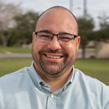
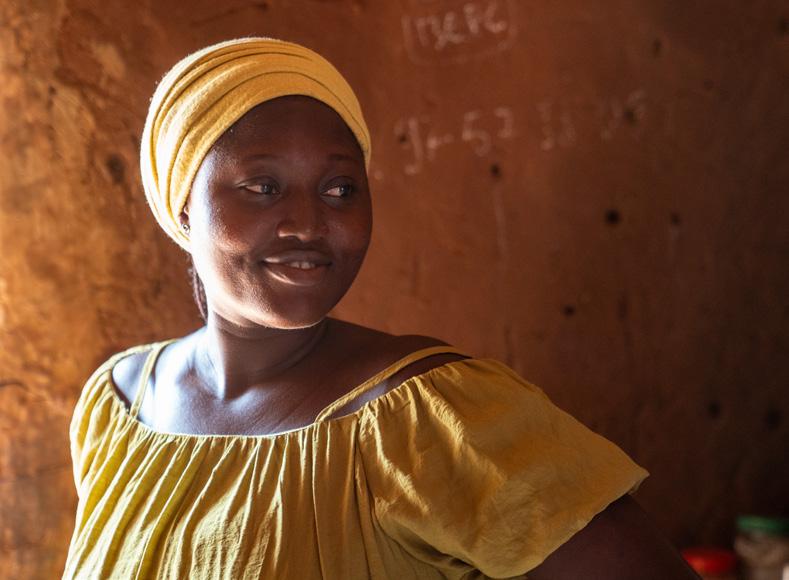


Lauren Lamb (above), CBF Communications and Marketing Manager, accepts the Best in Class award in Salt Lake City from RCC Treasurer Rev. Brian Fesler.
Retiring field personnel embodied CBF’s missions ideals
By Marv Knox
Thissummer, the Cooperative Baptist Fellowship is honoring the ministries of retiring field personnel who committed their lives to cultivating beloved community, seeking transformational development and bearing witness to Christ around the world. They stood in the spotlight when CBF honored them during its General Assembly in St. Louis, June 24-26. But their ministries occurred far from that stage, where they provided support for people forced into global migration, fed and comforted victims of global poverty and collaborated to extend the capacity of the global church. They demonstrated how sustained presence matters in missions.

In fact, the “retiring” field personnel are continuing on in their ministries or something almost like it.
The outgoing field personnel participated in an early retirement incentive program made possible by an estate gift, which was available to missionaries over age 60.
They represented CBF’s highest ideals, CBF Global Missions Coordinator Laura Ayala said. “Each individual has provided care with dignity and compassion, embodying the love of God in every interaction,” she noted. “Throughout their years of service, Jesus Christ has been at the heart of their mission, guiding their actions and inspiring those they served.”
Among the retiring field personnel:

Anna Anderson
Anna Anderson has focused on alleviating poverty in northeastern North Carolina through Together for Hope, CBF’s rural development coalition. She has served alongside her husband, LaCount, working with Conetoe Family Life Center in Conetoe and First Baptist Church of Ahoskie.
Anna’s multi-faceted war on poverty has included growing a 27-acre garden, distributing food, running literacy workshops, teaching piano, providing after-school care and tutoring. She multiplied her ministry through partnerships with churches and community organizations.
Anna received Baptist Women in Ministry of North Carolina’s Anne Thomas Neil Award for excellence in ministry. The honor recognized her for “just being there,” she reflected. “Just being there has an eternal impact that you cannot know at the time or measure its meaning while you’re in the middle of it. But continuing to show up means something to someone down the road and is a high and holy calling. Presence matters. It always has.”
Anna continues to minister with LaCount through their nonprofit, Eastern North Carolina Poverty Network, a CBF Global Missions engagement partner.
Chaouki and Maha Boulos
Chaouki and Maha Boulos have identified with suffering, because they have suffered, too. They have served in their native Lebanon amidst human migration and regional violence. They experienced the same food scarcity, power outages and infrastructure unreliability as the refugees they have comforted.
They conducted evangelistic Bible studies and helped pastors launch ministries and support orphanages. Here’s a divine irony: a Syrian soldier murdered Chaouki’s father, and the Bouloses spent years offering food, medical assistance and educational programs to Syrians fleeing civil war.
“You see what is going on. You cannot just sit and watch. Jesus told us to love everybody,” Maha said. “We have to respond to the needs of people.”
“Our task is to reach the unreached, the poorest of the poor,” Chaouki emphasized. “But sometimes we have to think about the rich. We have to think of the key leaders in every place. Because, if you win them to the Lord, big changes happen for everyone.”
They are continuing their ministry through their Lebanon-based ministry.
Steve Clark
Steve Clark and his wife, Annette Ellard, began loving the Karen people during a mission trip to Thailand. They saw God’s design in their love shortly after they became field personnel, when the U.S. State Department resettled refugees from Burma, and their city, Louisville, Ky., became a preferred resettlement location.
Across a couple of decades, Steve and Annette have embodied the presence of Christ to Karen, Chin, Karenni and other refugees from Burma. They grounded their ministry in building relationships and making their new friends feel at home, even as they preserve their cultural identity.
They have helped refugees access education, healthcare, legal services and employment. And they have provided spiritual nurture, offering encouragement and comfort in the celebrations and struggles of refugees’ lives. Steve is continuing his ministry with Annette, who remains with CBF.
“I will always be grateful to all my Karen, Chin, Karenni and other friends from Burma whose support through the years has enabled me and Annette to continue to serve their communities as God has called us to do,” Steve said.
Lynn Hutchinson
Lynn Hutchinson and her husband, Mike, flipped the traditional equation about poverty during their long ministry in Togo, West Africa, one of the world’s poorest countries. Rather than focusing on what a community lacks, they emphasized strengths, an approach called asset-based community development.
So, they empowered Togolese people to lean into their natural strengths to achieve sustainable progress. For example, they helped mothers see they could protect their children’s health by cleaning the streets of garbage and human waste, spawning a national movement.
Throughout their ministry, they prompted incremental progress by helping communities—first in Togo and then among refugees in Portugal—foster child health, improve education and strengthen cultural cohesion. “Transformational development doesn’t start with scarcity or lack, and this is important because there are so many needs,” Lynn explained. “Our work focuses on what people have, what resources are present. Everyone has something they can share with the community.”
After taking a break, Lynn will join Mike, who retired from CBF last year, in periodic ministries in Togo and continue community outreach in Portugal, where they live.
Jenny Jenkins
Jenny Jenkins extrapolated her experience as a nurse to bless people in Grand Goâve, a remote mountainous region of Haiti. She regularly conducted three mobile clinics to treat and educate sufferers of high blood pressure, diabetes and other life-threatening illnesses.
Jenny’s empathy also led her to support the Grand Goâve Education Initiative to develop teachers and leaders, as well as to provide tutoring, mentoring and meals at a school operated by Siloe Baptist Church until 2017. More recently, she has focused on mountain schools near Magandou, providing food, textbooks and reading programs to support education.
“I look at what God is doing in my community, and God has allowed me to come alongside what God is already doing. God is already active and present, and still God invites us to come and be part of that work,” Jenny said. She expressed gratitude for long-term presence that has allowed her “to hear the needs and to develop the respectful conversations that open doors to changing lives.”
Jenny is exploring possibilities for continuing to minister in Haiti.
Mary
Mary invested herself in Southeast Asia, where she collaborated with individuals and groups to improve lives by strengthening diverse communities. She helped people identify not only their needs but also their strengths, and then she helped them launch initiatives that were sustainable and that improved the cohesion of their societies.
Mary took the time and effort to learn the languages and to listen to the stories of the people where she lived. This helped her understand the local culture and foster mutual respect—the building blocks of trust and effective partnerships. Her labor of love resulted in support for educational programs, healthcare initiatives and economic development projects, all of which improved people’s quality of life and made them more self-sufficient.
Acknowledging she lived in a country where Christians comprise less than two percent of the population, Mary thanked God for choosing “to engage us to be the heart, hands and feet of the good news.”
Mary is continuing her ministry with partners in Thailand.
Karen Morrow
Karen Morrow has been a beacon of hope for refugees resettling in Fort Worth. She has welcomed and formed relationships with families fleeing violence, persecution and other hardship around globe, while expanding her ministry by engaging local churches in the welcome effort.
Like a friendly neighbor with superpowers, Karen has connected refugees with early childhood education and adult English classes, while helping them find housing and jobs, access higher education and understand cultural literacy.
Karen developed Ready for School, a curriculum that prepares immigrant children and their parents for the U.S. school system. And she founded Hope Library for newly-arrived immigrants in Kingdom Manifestors Church, located across the street from a settlement of refugees.
Immigrants and refugees are all around us, Karen said. “God is restoring to them an abundant life, and we can partner in that work, right in our own communities.” Karen continues in ministry, collaborating with her son-in-law and daughter, Israel Loachamin and Emily Morrow-Loachamin, to serve immigrants while also balancing time with her grandchildren.
Cindy Ruble
Cindy Ruble has invested much of her life as a first responder to victims of human trafficking, sexual assault and domestic violence. Serving in Indonesia and then Malaysia, she advocated for women and children. Across the decades, she helped some of the world’s most vulnerable people recover from some of the worst humanity has to offer.
Cindy believes to be truly good, the Good News must proclaim justice. To that end, she partnered with churches and local organizations to support survivors of violence and abuse, empowering them to recover and thrive. They created the Women’s Centre for Change, which provides school outreach programs, court advocacy, counseling and training.
Through it all, Cindy has championed and modeled resilience. “Resilience is finding new ways to do what you need to do when your old ways no longer work,” she explained. “Resilience means not giving up. Resilience is the ability to bounce back during difficult times.”
Resilient herself, Cindy is continuing her ministry alongside local partners.
Greg and Sue Smith
Greg and Sue Smith have been the faces of welcome to two generations of immigrants seeking new opportunities in the United States. They combined empathy, insight and legal expertise to offer dignity, sustainability and integration into communities their new friends call home.
More than 20 years ago, they helped found LUCHA Ministries, a faith-based nonprofit serving first-generation Latinos in Fredericksburg, Va. They enabled immigrants to experience God’s love through advocacy as well as by providing social, emotional, physical and spiritual support. Greg directed LUCHA’s Immigration Legal Services program; Sue focused on pastoral care.
“If Scripture is the foundation of our faith, then it is the foundation for our understanding of immigrants,” they said. “Scripture, not culture or politics or the media or personal opinion, is the place where the follower of Jesus begins framing a moral or ethical approach to immigration.”
After 38 years of mission engagement, they now live back in their native Arkansas. Greg will continue in ministry, while Sue continues to manage CBF’s Strengthening Families Initiative, a program funded by the Lilly Endowment.
Mary VanRheenen
Mary VanRheenen and her husband, Keith Holmes, have worked alongside Romany for the past 28 years. They live in the Netherlands but work with Romany all across Europe. The Romany are among the most disenfranchised people anywhere.
As part of CBF’s Romany Team, Mary and Keith focused on helping Romany believers share Jesus’ love with their own people and establish self-reproducing churches. Keith recorded scripture resources, particularly in the Romany languages, while Mary concentrated on culturally appropriate educational materials—Davar: Bridging to Literacy—and a partnership with Romany outreach in Moldova.
Experience gleaned from many years in the field has shown Mary how to evaluate ministry. “The process of building respect, local leadership and mature churches is more important than tallying short-term results,” she said. “While we have to be accountable, we do not have to give a head-count.”
Mary and Keith continue to live in The Netherlands and serve with partners across Europe. Mary, like Keith, has now transitioned from salaried CBF field personnel to volunteer field associates.
Marc Wyatt
Marc Wyatt spent four decades demonstrating how Christian hospitality defines what “love your neighbor as yourself” means. “Biblical hospitality is a transformative way of being Christian,” he explains. “It’s giving ourselves to people.”
After ministering in Thailand and then serving 15 years alongside Canadian Baptists, Marc and his wife, Kim, returned to their home state, North Carolina. All along the way, they embodied the presence of Christ for refugees and asylum seekers.
Career highlights include starting the Matthew House and a furniture bank in Canada; helping publish the New Testament in the Eastern Oromo language; helping plant Congolese, Colombian and Afghan churches in North Carolina; and helping start the Ukrainian Cultural Center in Raleigh.
Marc and Kim also leaned into their entrepreneurial spirits to found Welcome House Raleigh, the Welcome Network and the Welcome Network Grant. All three ministries offer or support housing opportunities that provide Christian hospitality to all kinds of folks— not only migrants, but also unhoused people, victims of abuse and others.
Marc continues as director of Welcome House Raleigh Ministries through CBF of North Carolina while Kim continues as a CBF field personnel.
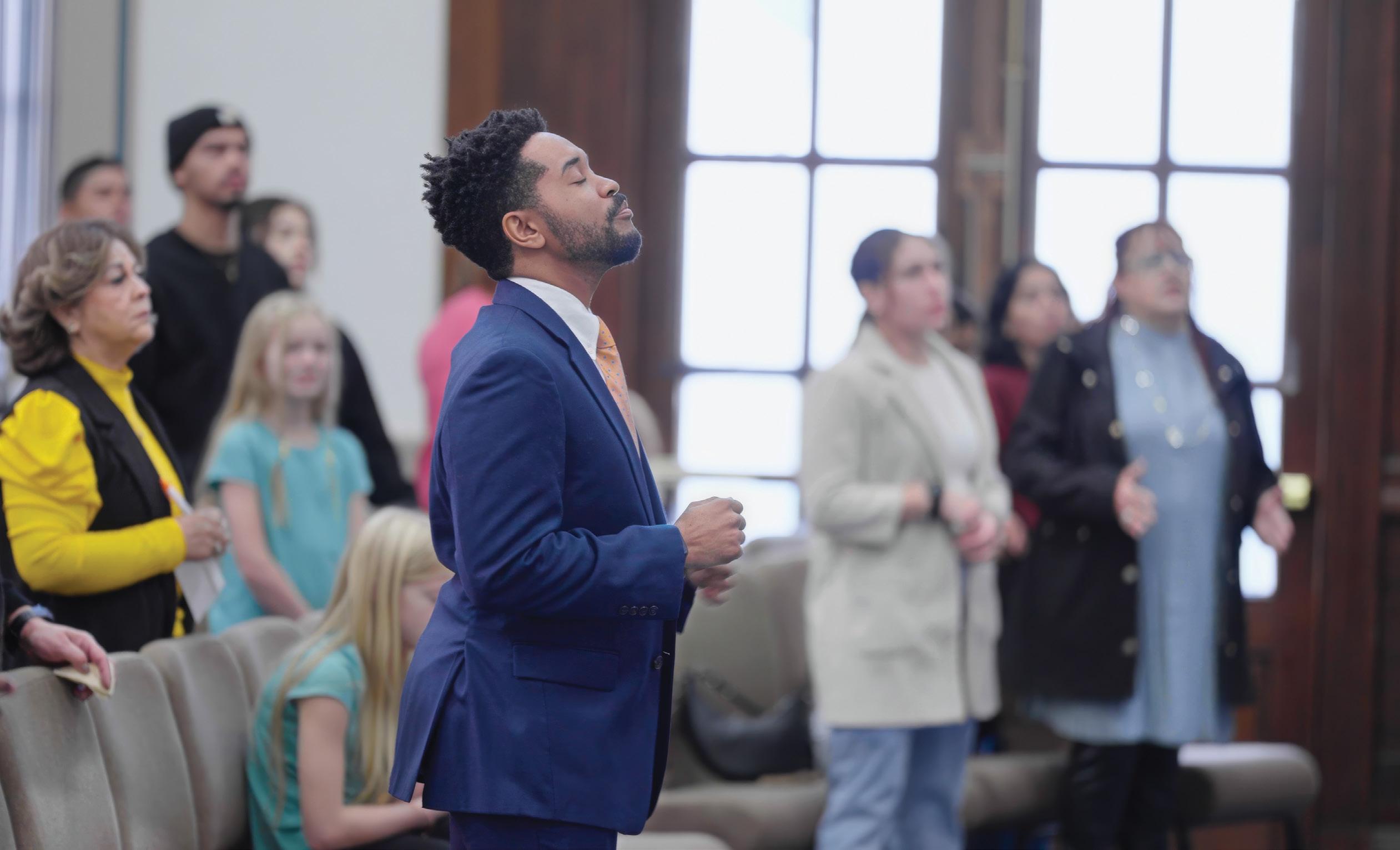
By Marv Knox
Called in Context
Benji
Beyond a congregational context, Suprice’s ministry arc bends toward collegians
Suprice recognizes parallels between his ministry and the arc of spiritual growth in college students he mentors.
Their trajectories begin with God’s claim upon their lives. They’re formed by experiences that deepen understanding. And they curve toward blessing others by loving God and serving people in the next phase of their lives.
The main difference is Suprice’s story started years ago, and the students’ stories are just beginning.
Suprice, 29, is an InterVarsity Christian Fellowship minister on four college campuses in the New London, Conn., area. He’s also
a member of Church of the City in New London, where he formerly served as youth pastor.
The arc of Suprice’s life makes him a likely model for Called in Context, the Cooperative Baptist Fellowship’s emphasis on helping churches find ministers in unlikely locations, such as among their own members.
That’s what happened to Suprice in the fall of 2021. Seeking a pastor for children and youth, the congregation found that person right among them, already serving and
nurturing its teenagers as a volunteer.
But Suprice’s path to ministry started much earlier.
“I grew up in a Haitian Baptist church in Boston,” he reported. “I started preaching there when I was 13. In many ways, that church launched me into ministry.”
Years later, he attended Gordon College in Wenham, Mass., where he met a classmate named Grace Martino. They graduated in 2018, when Martino moved to Decatur, Ga., to join the CBF staff and he moved to Charlottesville, Va., where he worked for a think tank studying culture.
By 2020, they were dating long-distance,
when the pandemic made remote working possible. She continued with CBF, but relocated to live near family in New London, where she grew up.
That triggered a chain reaction: She moved to New London in March. He proposed marriage—and she accepted—in May. Then he trekked to New London in August.
“I moved to Connecticut for love, not work,” he conceded with a chuckle.
Suprice quickly realized he not only loved his fiancée, but he also loved her congregation.
“Grace grew up in Church of the City where her dad was pastor, and so she has some legacy here,” he said. “But when we moved here, we thought, ‘Just because Grace grew up here doesn’t mean we have to be tied here.’ … But when we looked at getting to be part of the life of the community here, we realized, ‘Oh, this is home.’”
“I’ve never been in a church whose mission is so clear,” he added. “The church’s
motto is ‘We are a church in the city for the city.’ We are a multi-ethnic church in downtown New London. But we don’t want to be stuck in these four walls. We want to think deeply about what it means for the gospel to invite us into our neighborhood and community.”
The church blends Hispanics, Haitians, whites and others, reflecting the demographics of its city. It operates a community meals program, serves unhoused people, advocates for and supports immigrants, and launches nonprofits to meet a variety of needs. A core annual ministry, the Good Neighbors Project, sends church members across the city to labor in the community.
“It’s a church that cares deeply about the city and about justice work,” Suprice said. “Church of the City preaches the word of God, but we also realize we are called to care deeply about the lived experience of the people in our community.”
Suprice resonates with Church of the
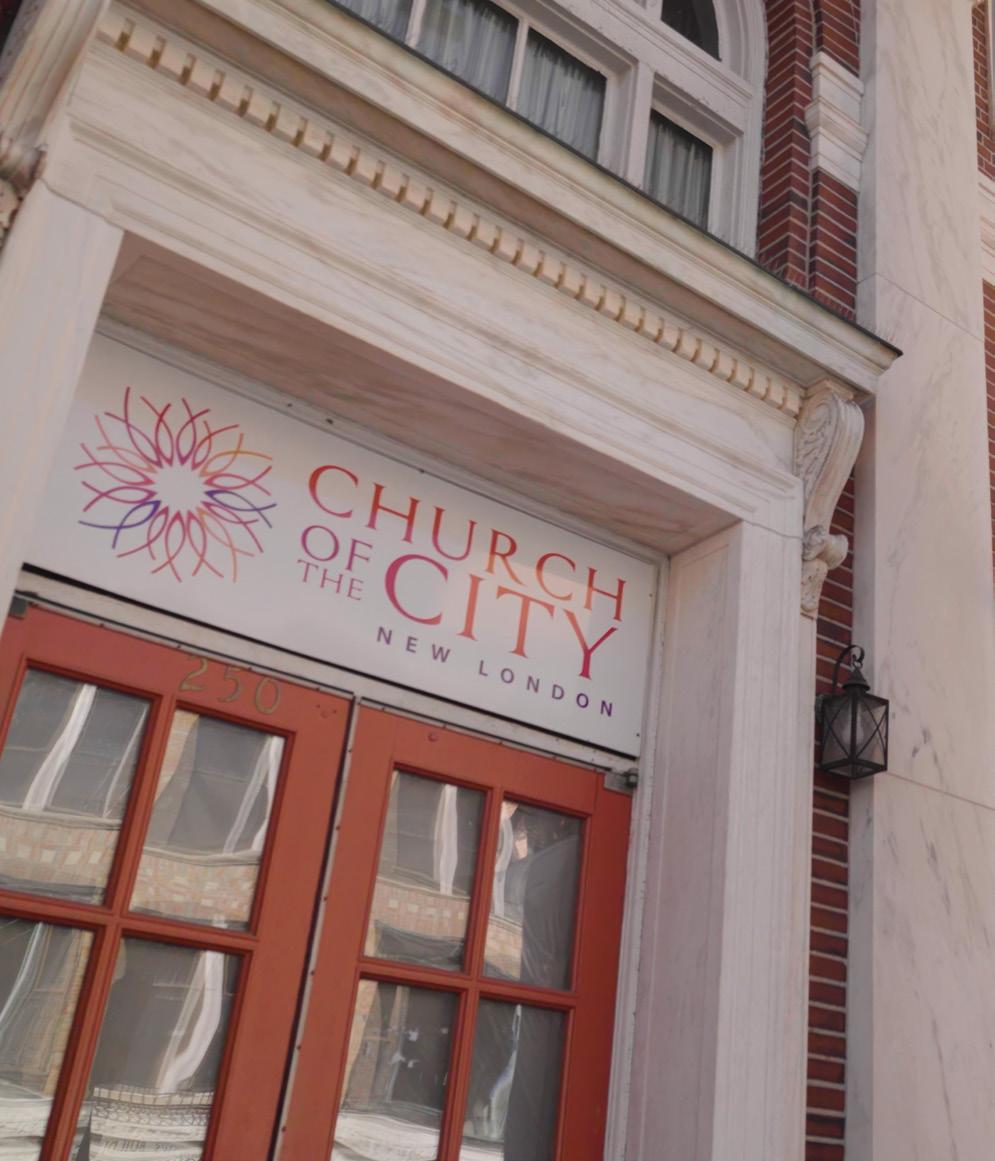
City’s mission. And he volunteered in the fall of 2020 to help rebuild the church’s youth ministry, which had been devastated by the pandemic.
But, of course, he still had to make a living. “I started off buying things off Facebook Marketplace, refurbishing them and selling them,” he said. “Then I also worked at New London High School as a tutor for Haitian students.”
A bit later, he saw an online ad by InterVarsity, seeking a campus minister at Connecticut College, located about three minutes from where he lived.
“I loved the idea of helping people connect their lives with faith, particularly in the college process,” he said, explaining why he took the job. “At a time of engaging their minds, college students need to understand they do not have to negate the other parts of themselves God has created and wants to speak to.”
“Campus ministry is not about replacing the church, but about learning to partner

At Church of the City in New London, Conn., Suprice once served as youth pastor, helping rebuild the youth ministry after the pandemic. He continues to reflect the church’s mission to be “in the city for the city.”
Pursuing his Master of Divinity at Yale Divinity School, Suprice now focuses on college ministry while preparing for the future. His journey exemplifies CBF’s Called in Context initiative, which helps churches recognize and nurture calling from within.
with the church,” he added. “At the time, I started looking for how to build bridges between Church of the City and campus ministry.”
Suprice felt supremely motivated to build those bridges because of Church of the City’s winsomeness. And his responsibilities within the church multiplied in the fall of 2021. Shortly after Jesús García became the church’s new lead pastor, he tapped Suprice to be pastor to children and youth.
“I believe in building the church from the ground up, and that starts with a vibrant children’s and youth ministry,” noted García, who started as youth pastor in another church where he grew up and later served that congregation as lead pastor 19 years.
“When I arrived at Church of the City, I understood we need to send a clear message: ‘Children and youth must be a priority,’” he said. “Benji emerged as the perfect candidate for the children’s and youth pastor. I already
heard about his remarkable work as a lay leader with the youth. I sensed a genuine pastoral calling in him and felt he was the right person to champion this vital ministry.”
García cited three profound benefits of calling pastors from within the church: They already know the church’s “culture, values and people.” Their calling affirms “God continues to call and equip individuals from within.” And it “provides a tangible role model for others in the church who may be discerning their own callings.”
As Suprice joined the church staff, he maintained his campus ministry with InterVarsity.
“It was a unique twist on a ‘bivocational’ calling, with both jobs in ministry,” he said. “I was a bivocational minister, but I was working two extremely compatible jobs.
“And I was blown away by the amazing young people—in the church and in the campus context—I came in contact with and
learned from. They are phenomenal and a gift to this community.”
Over time, Suprice realized he should grow as a minister by getting more education. So, he enrolled at Yale University Divinity School, where he is earning a Master of Divinity degree.
But he could not simultaneously be the husband he wants to be, a minister holding two jobs and a committed student. He decided his best course was to step down as youth pastor at Church of the City and focus on his family, education and ministry to college students.
Suprice received an outpouring of grace from the church. The congregation affirmed this important step in his calling. Part of being “for the city” meant blessing him to grow, as well as to keep blessing others.
Suprice’s decision became “a moment to celebrate the God who continues to call and develop individuals,” García said. “God is a

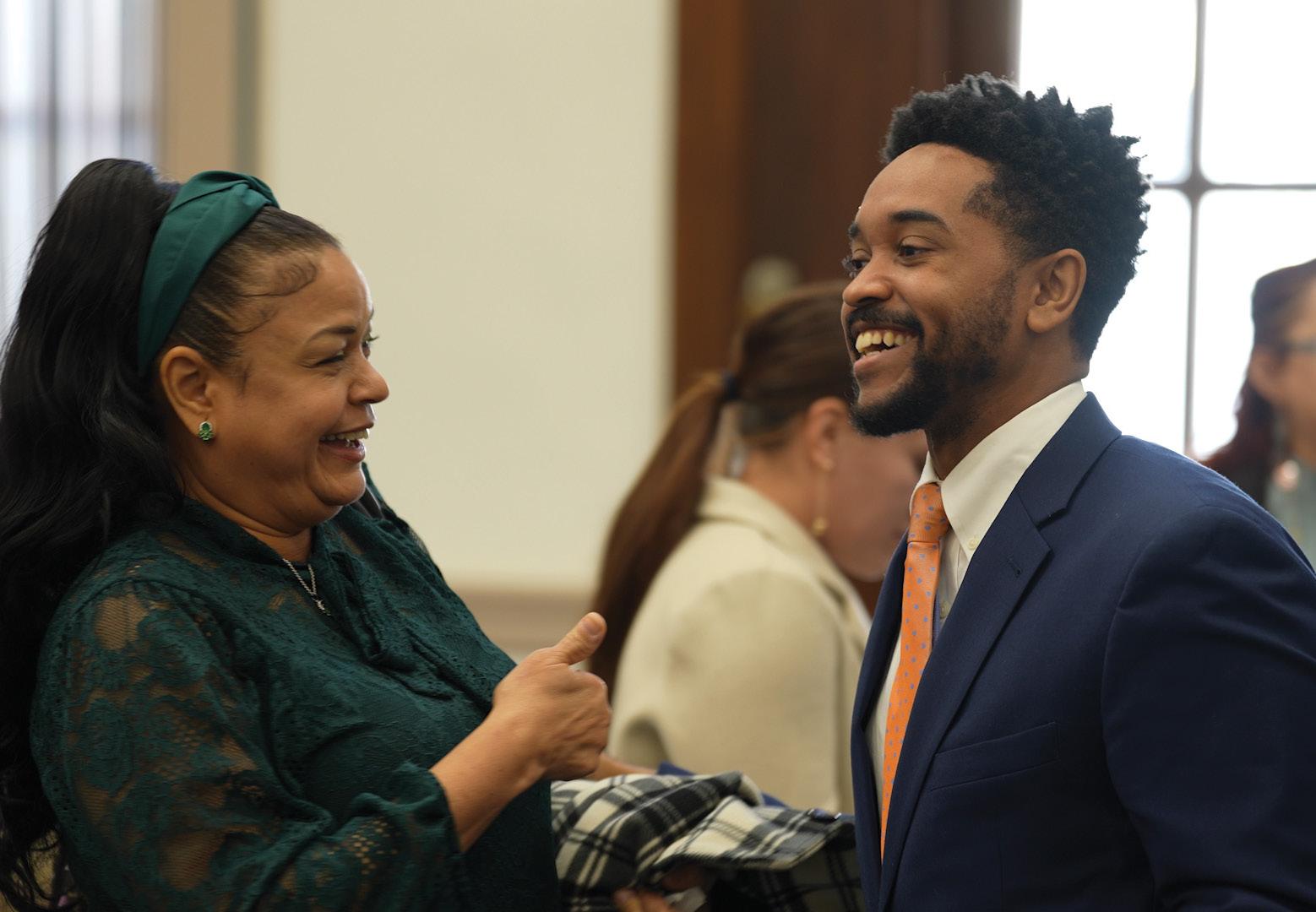
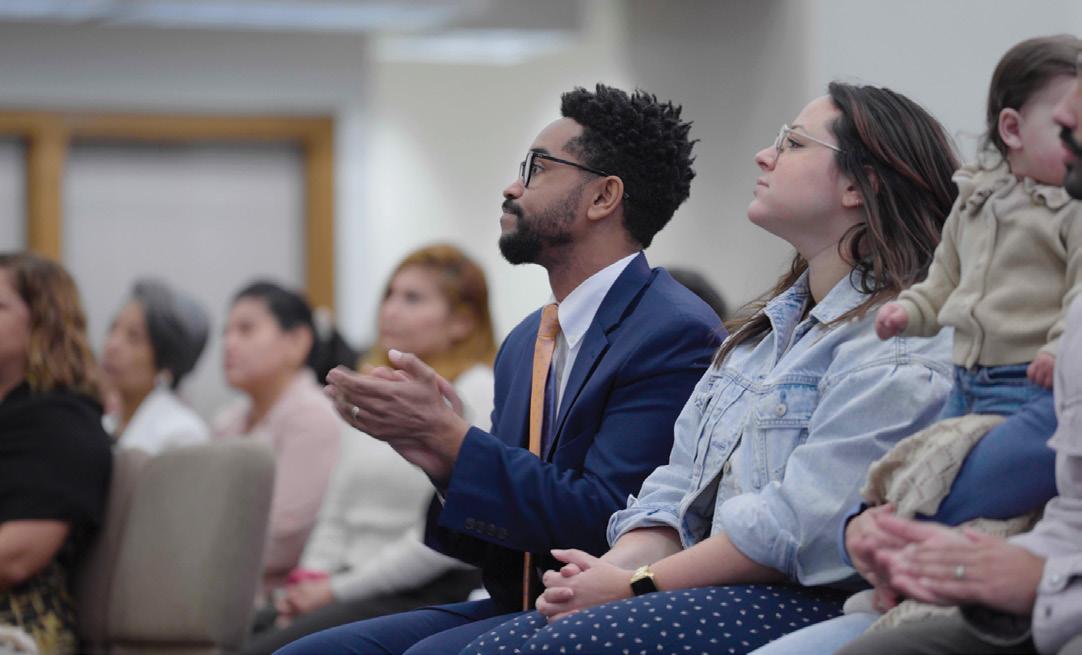
(Below) Suprice sits with Antonio Vargas, CBF Vestal Scholar of 2023, Yale Divinity graduate and former associate pastor at Church of the City.
(Bottom Right) Suprice’s wife, Grace, grew up in Church of the City, and when they joined the community said “This is home.”
“I LOVE AND FEEL CALLED TO THE LOCAL CHURCH. BUT I’LL ALWAYS FIND SPACE FOR COLLEGE STUDENTS.”
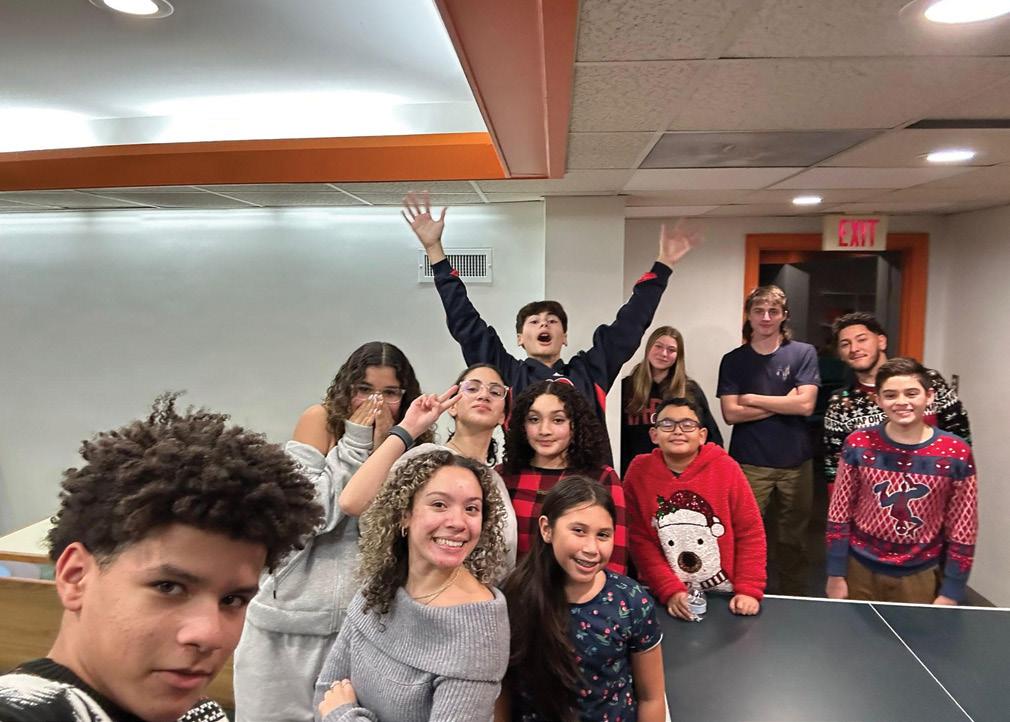
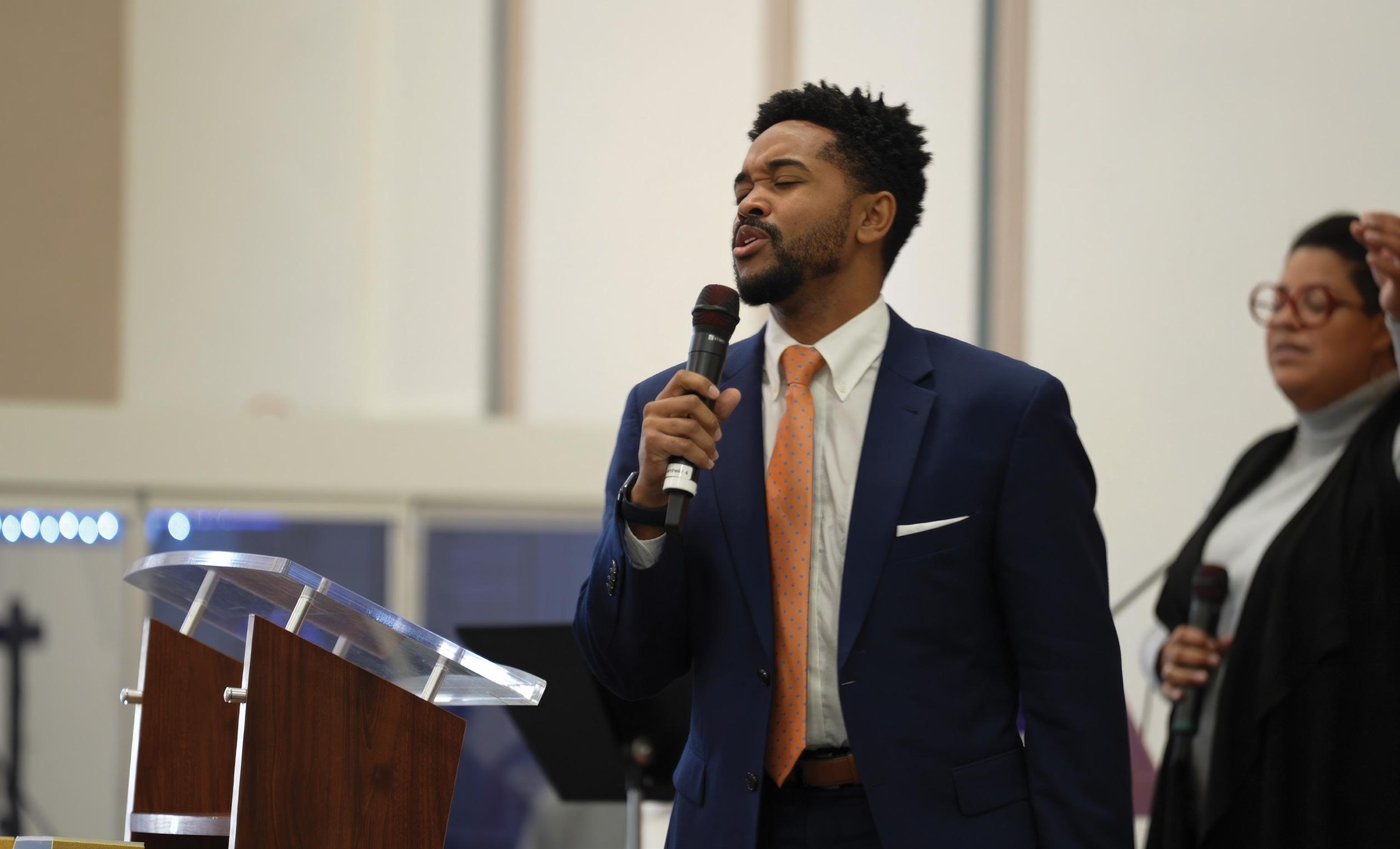
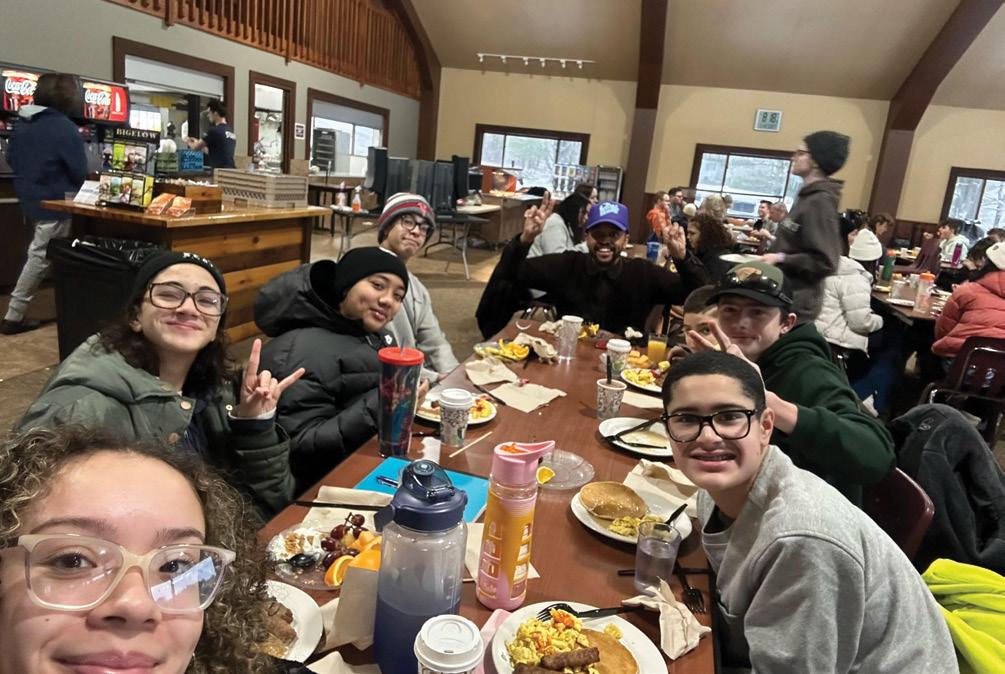
god of provision, and I was confident God would provide for Benji, just as he would for us as a church.”
Suprice’s journey “serves as an inspiring example to the church that callings are to be celebrated, not stifled, Garcia added. “We shouldn’t close doors, because this work belongs to the Lord. Benji’s pursuit of his M.Div. is a testament to his growth and our commitment to supporting his continued development in God’s calling.”
That step has anchored Suprice’s perspective on ministry and the church.
“The anchoring has reminded me that, yes, I’m a pastor,” Suprice said. “I love and feel
Suprice is a great example of Called in Context after he was called from his own congregation to serve as youth minister.
“I sensed a genuine pastoral calling in him and felt he was the right person to champion this
“Campus ministry is not about replacing the church, but about learning to partner with the church.”
called to the local church. … But I’ll always find space for college students, either on campus or in church.”
In other words, the trajectory of his ministry always will remain connected both to church and to students.
The arc of Suprice’s ministry illustrates how congregations can find the next generation of church leaders already sitting in their pews, stressed Colin Kroll and Brian Foreman, CBF staff members who developed and promote the Called in Context initiative.
“Called in Context can empower congregations to name, notice and nurture ministerial calling in ways that extend
beyond creating a job for someone,” explained Kroll, CBF’s young adults ministry manager. “Don’t you love how Church of the City called Benji out to serve its students and also released him to minister more broadly in the community?”
Calling ministers out of the context of their own congregations enables churches to strengthen their ministries and, in cases like Suprice’s, to serve others as well, added Foreman, CBF’s coordinator of congregational ministries. “Churches are filling ministry positions with strong home-grown ministers. And sometimes, like Benji, they release them to serve the larger community.”
vital ministry,” said Jesús García, senior pastor who first hired Suprice.

